Angela Merkel has said that Britain will have to “live with the consequences” of Boris Johnson’s decision to ditch Theresa May’s plans for close alignment with the European Union after Brexit.
With the prospect of a no-deal Brexit looming large after the UK rejected EU demands for a level playing field on environmental and consumer protections and workplace rights, Ms Merkel said that the prime minister’s position pointed towards a “less closely interconnected economy” following the end of a transition period in December.
And she appeared to dash London’s hopes that Germany will devote its six-month presidency of the EU – starting next week – to pushing through a last-minute deal, stating instead that her priority was a pandemic rescue plan for the European economy.
Download the new Independent Premium app
Sharing the full story, not just the headlines
Ms Merkel was speaking just days after the fourth anniversary of the UK’s referendum vote to leave the EU and almost five months after the formal date of Brexit on 31 January.
Her comments came as the regular European Social Survey by City University London found that 56.8 per cent of Britons would now vote to remain in or rejoin the EU, compared to just 34.9 per cent who would vote to leave – the equivalent of a commanding 62-38 split once non-voters are removed. This compared to a much closer 50-44 split in the same survey around the time of the 2016 referendum.
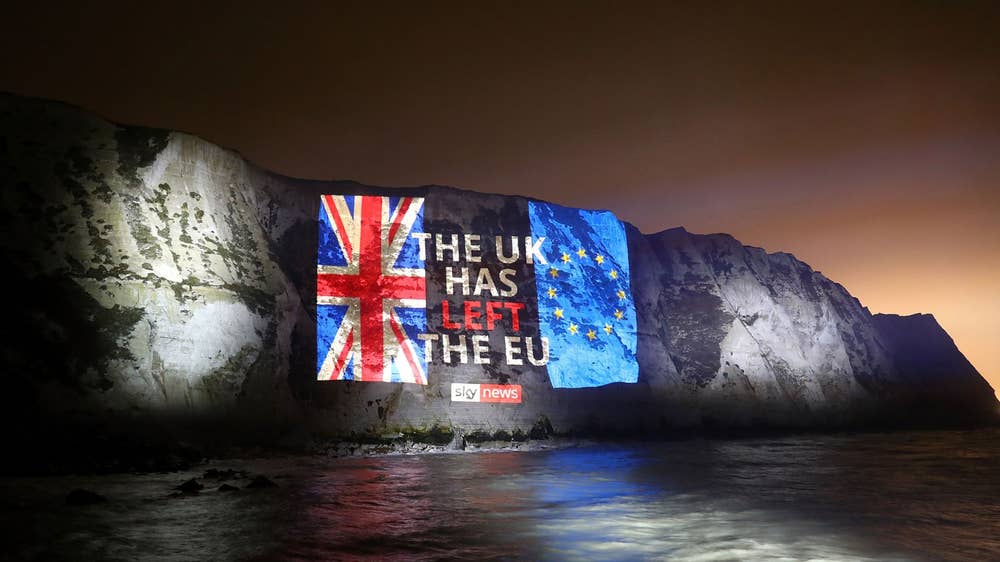
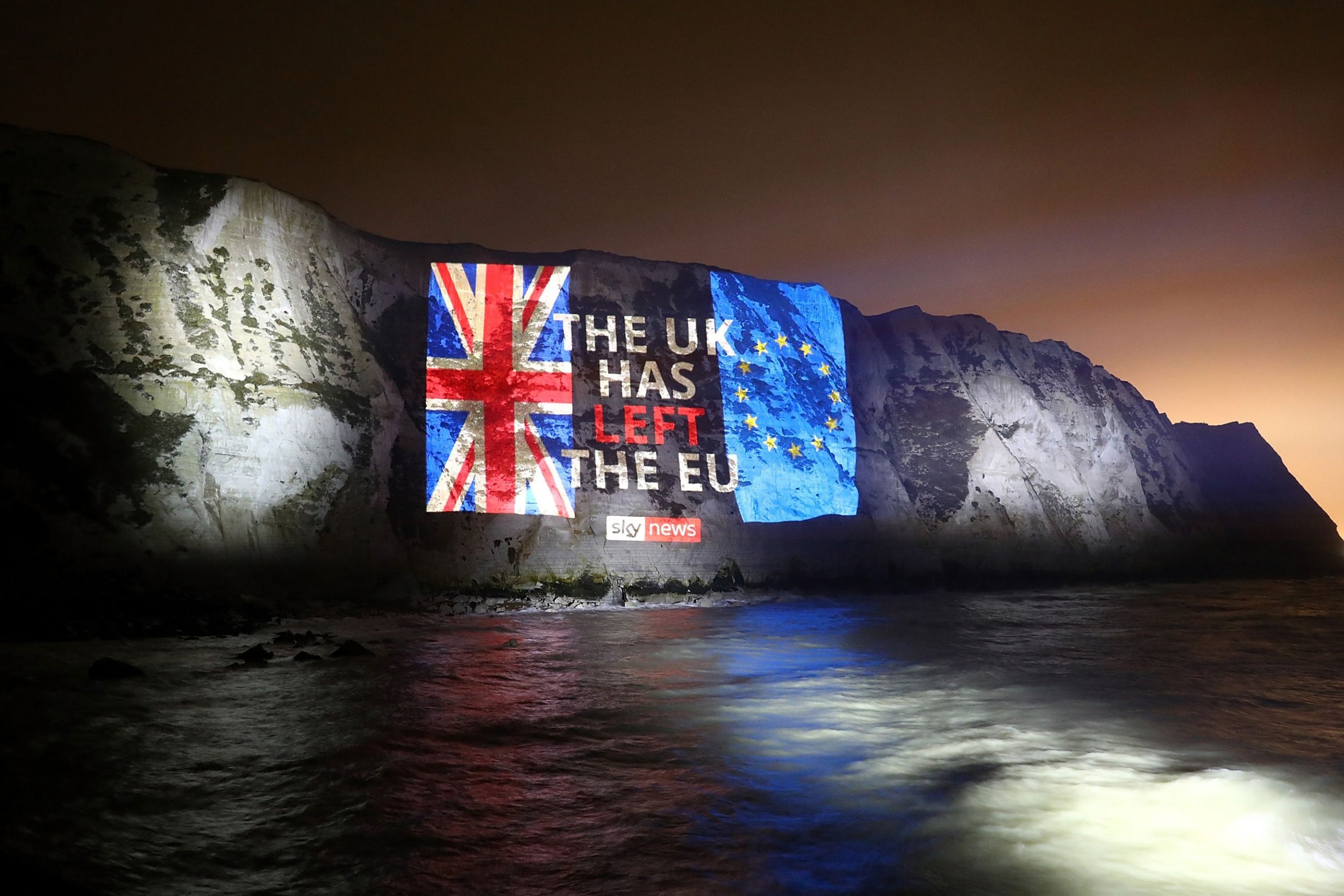
1/66
A message projected onto the White Cliffs of Dover
Sky News/AFP via Getty
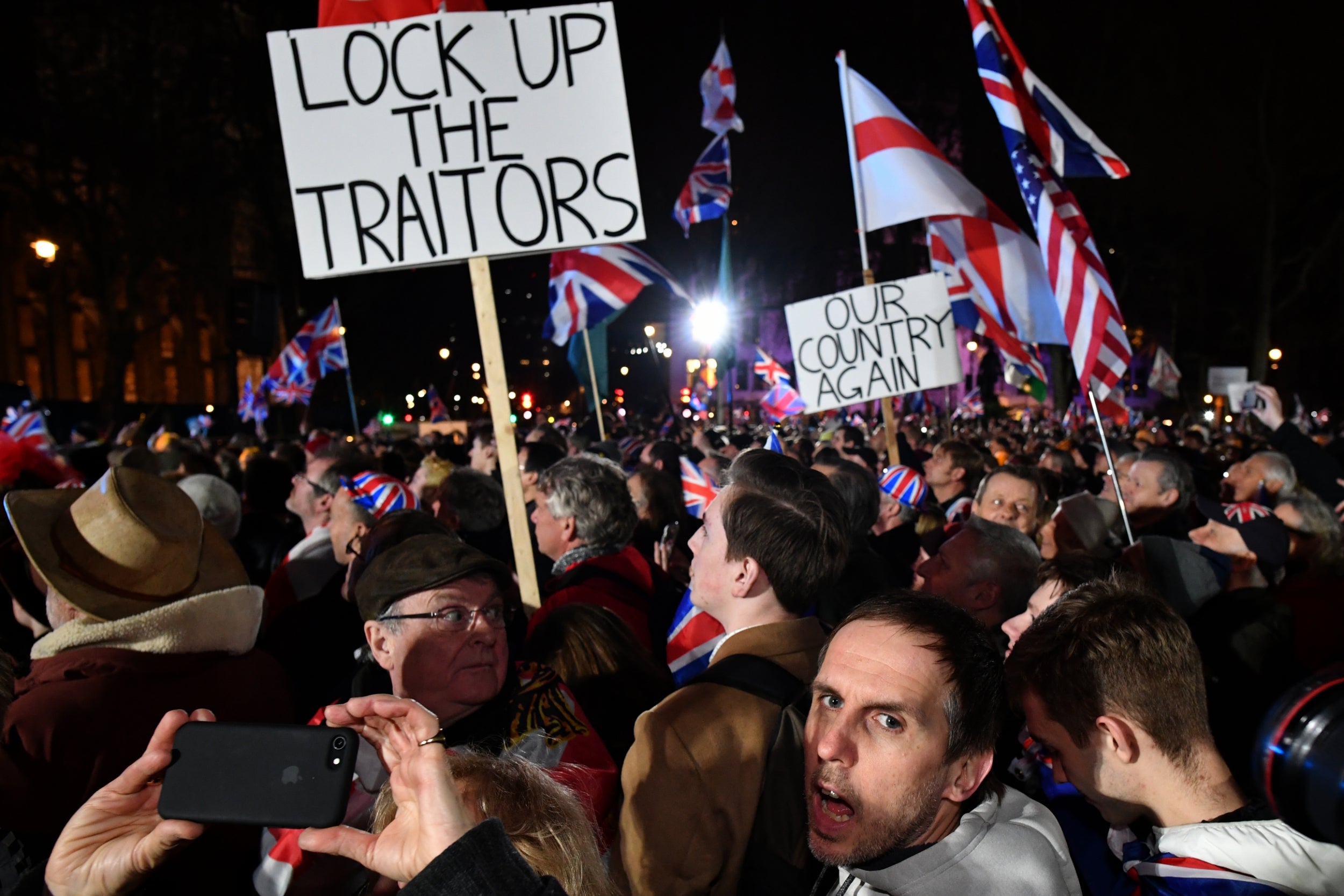
2/66
Getty
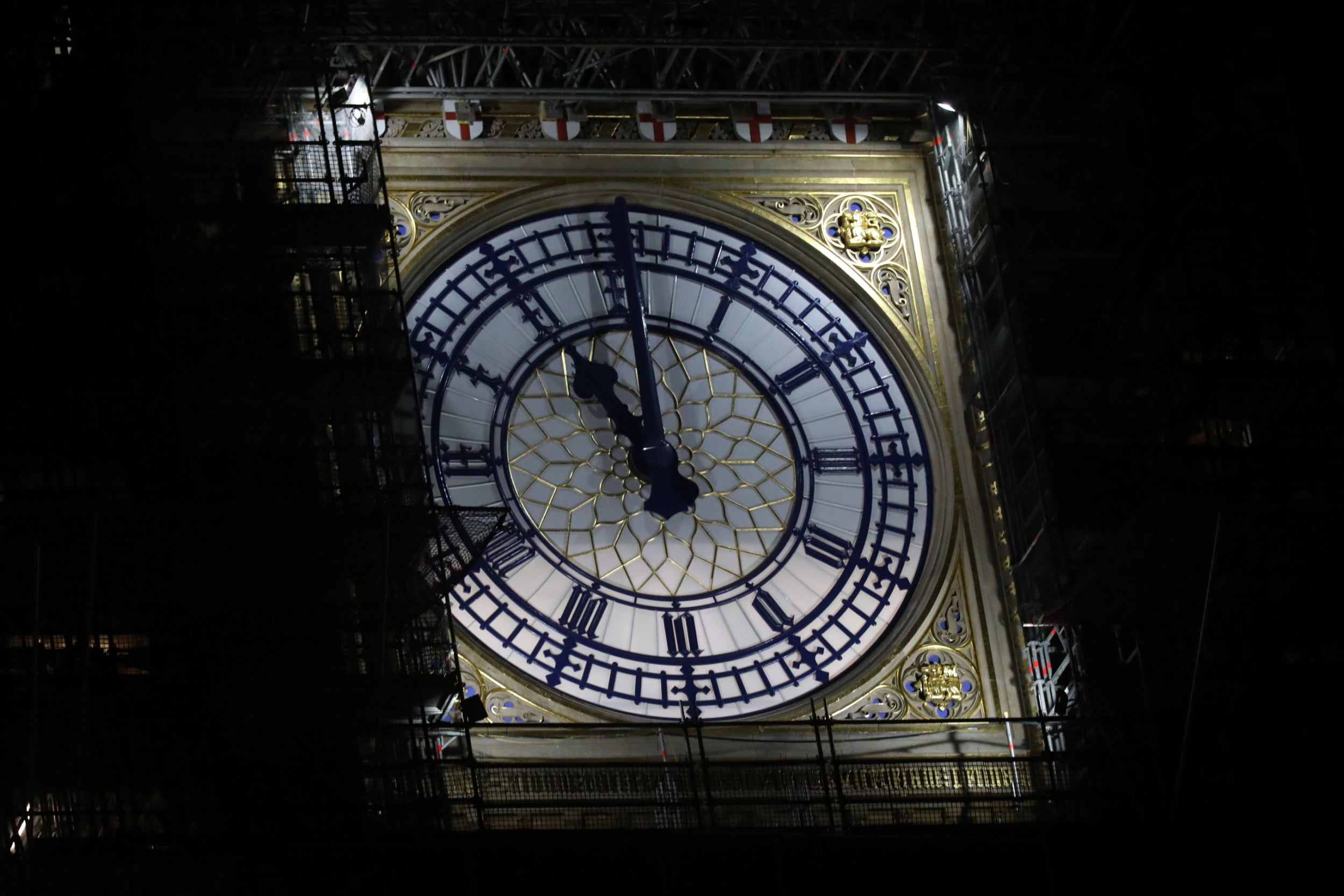
3/66
Big Ben, shows the hands at eleven o’clock at night
AFP via Getty Images
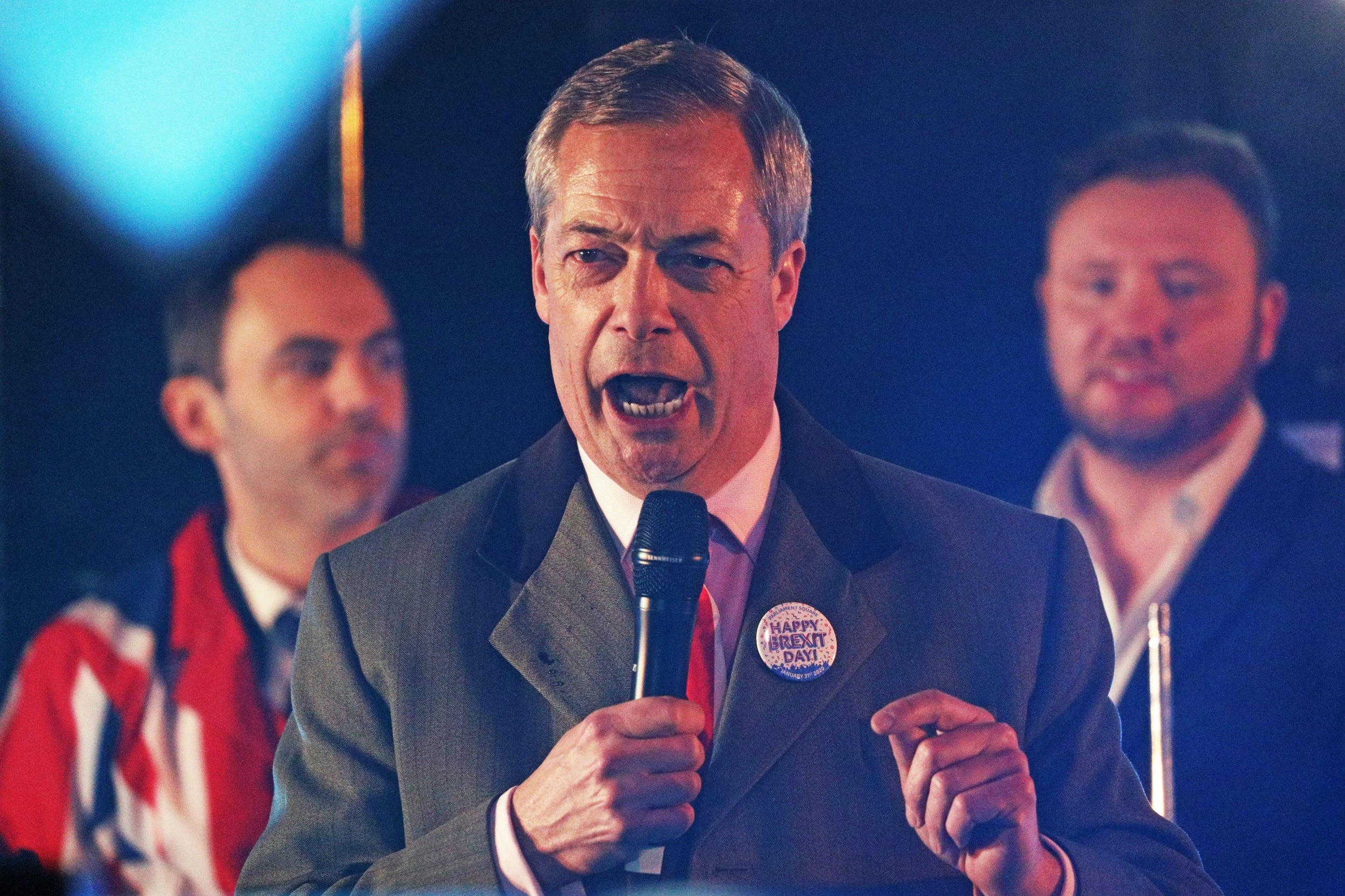
4/66
Nigel Farage speaks to pro-Brexit supporters
PA
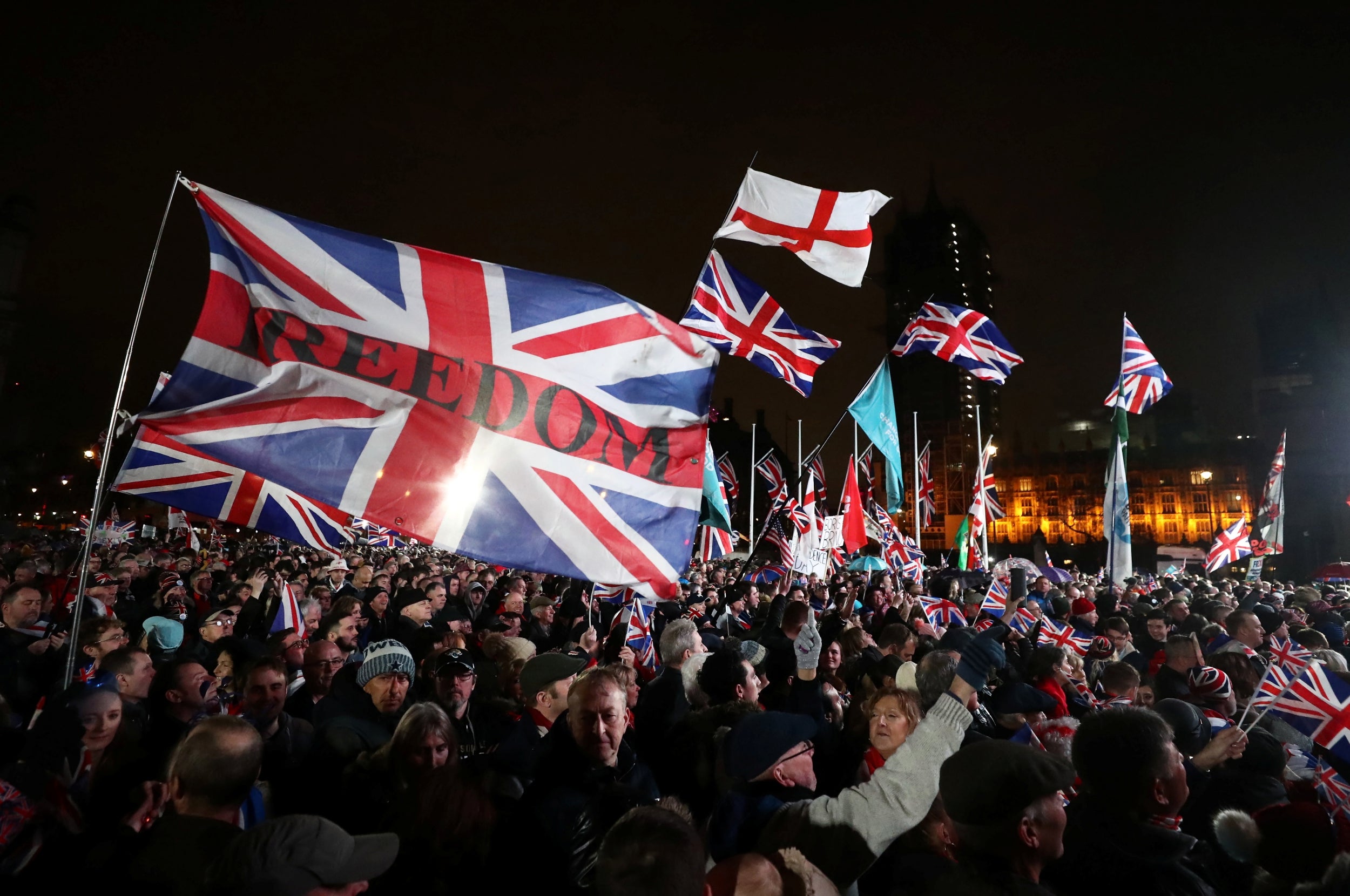
5/66
Pro-Brexit demonstrators celebrate on Parliament Square
REUTERS
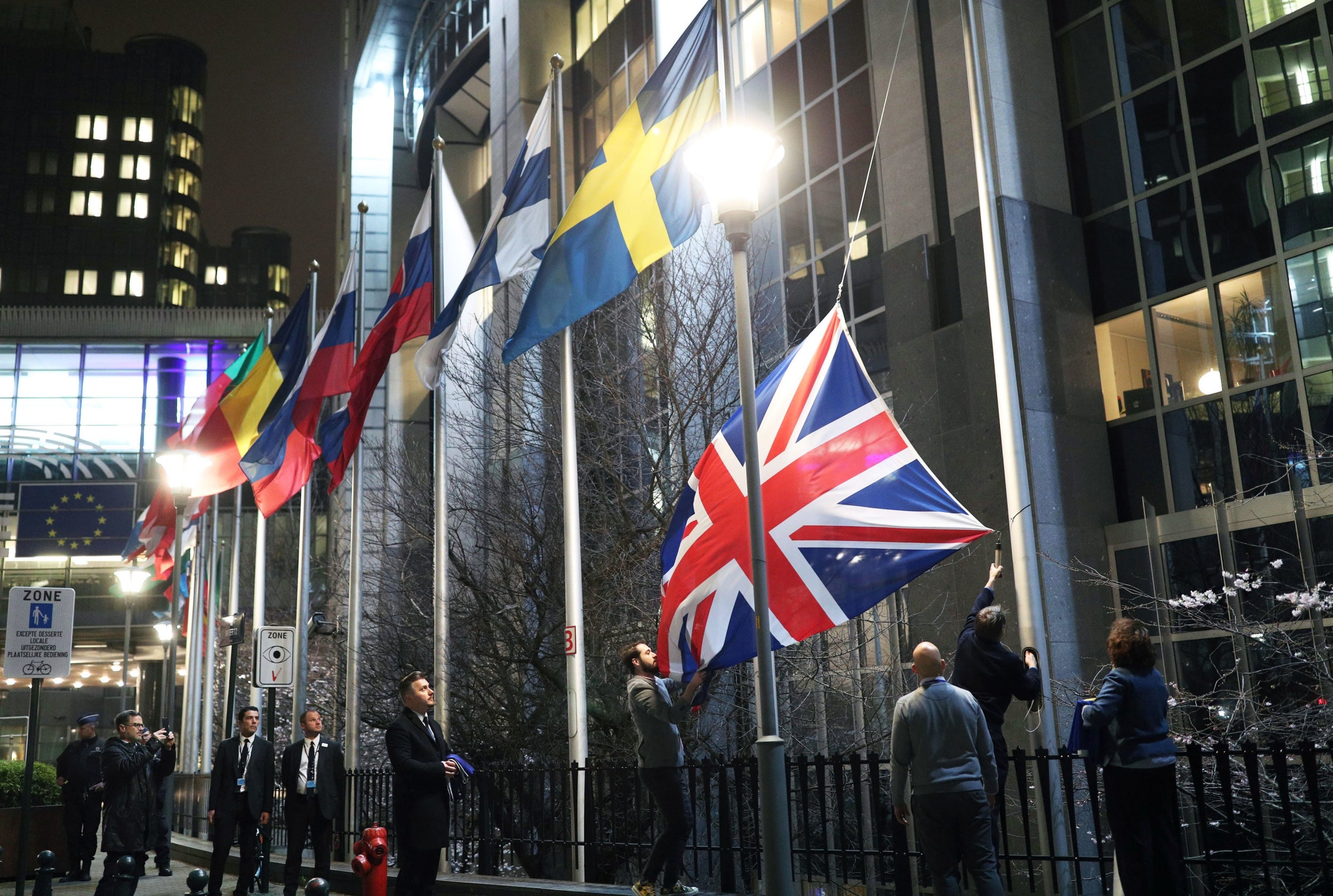
6/66
The Union flag is taken down outside the European Parliament in Brussels
PA

7/66
Pro-EU campaigners outside the Scottish Parliament, Edinburgh
PA

8/66
A pro-Brexit supporter jumps on an EU flag in Parliament Square
PA
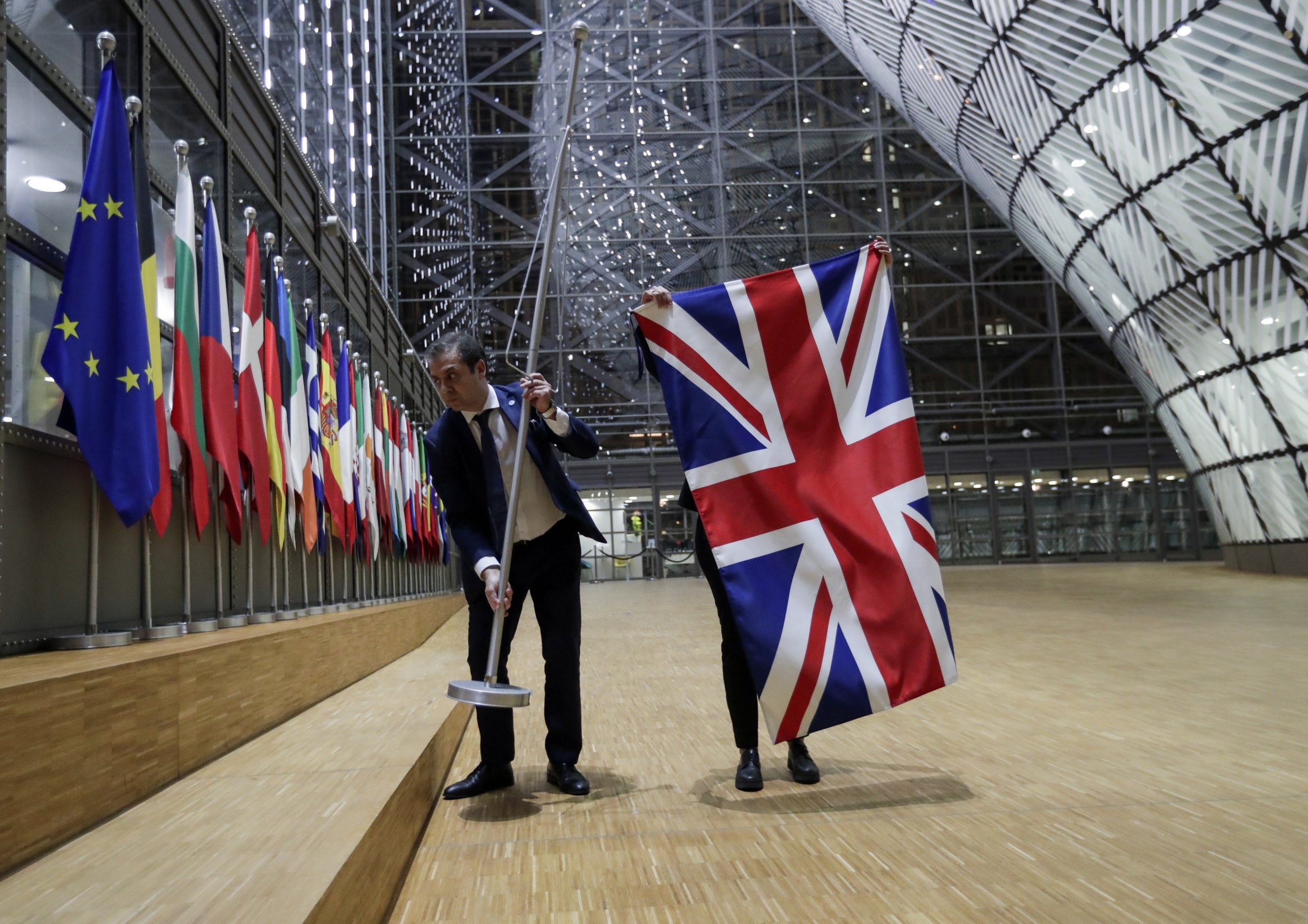
9/66
EU Council staff removed the Union Jack-British flag from the European Council in Brussels, Belgium
EPA

10/66
A pro-Brexit supporter pours beer onto an EU flag
PA
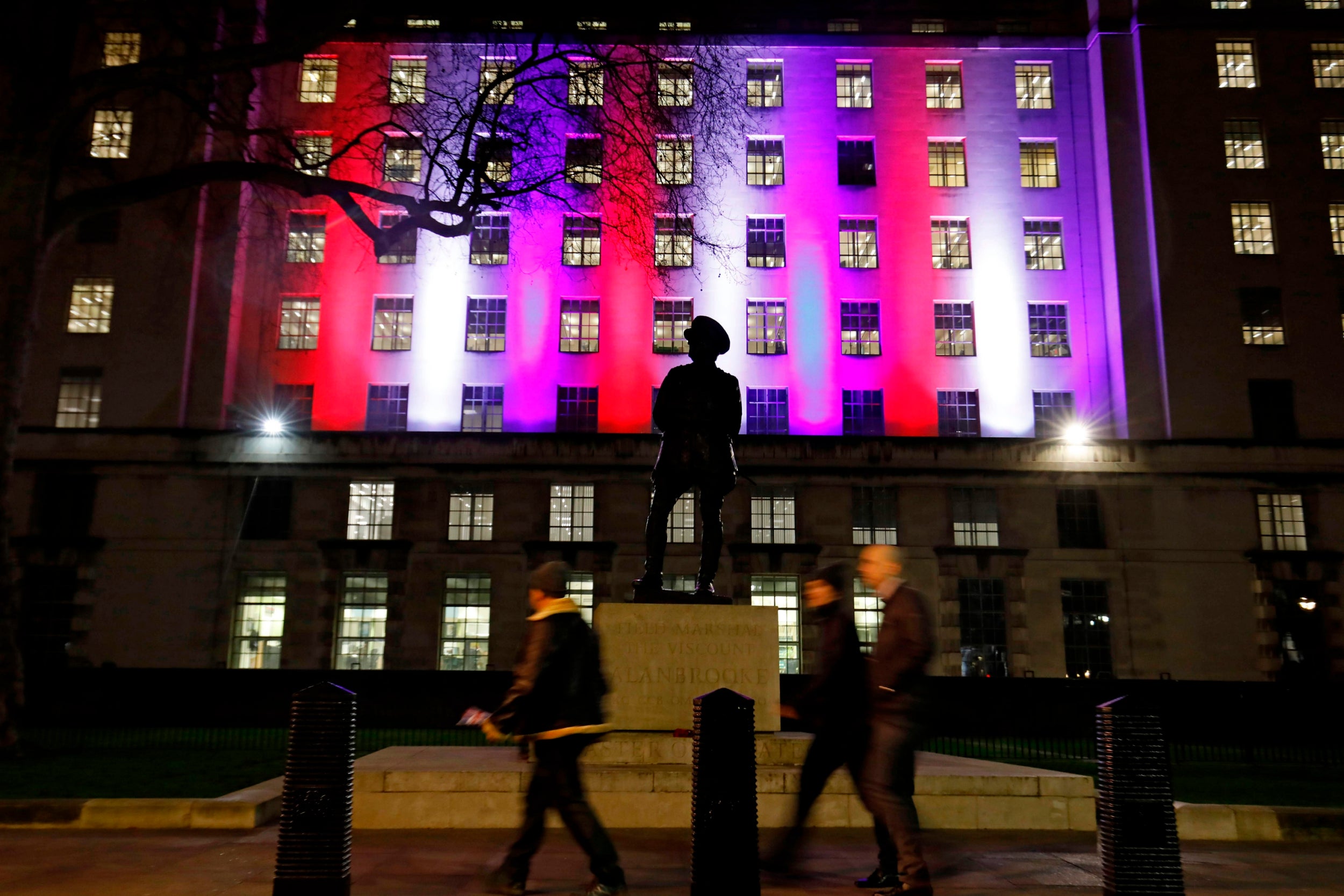
11/66
Pedestrians pass in front of the Ministry of Defence Building on Whitehall, illuminated by red, white and blue lights in central London
AFP via Getty Images
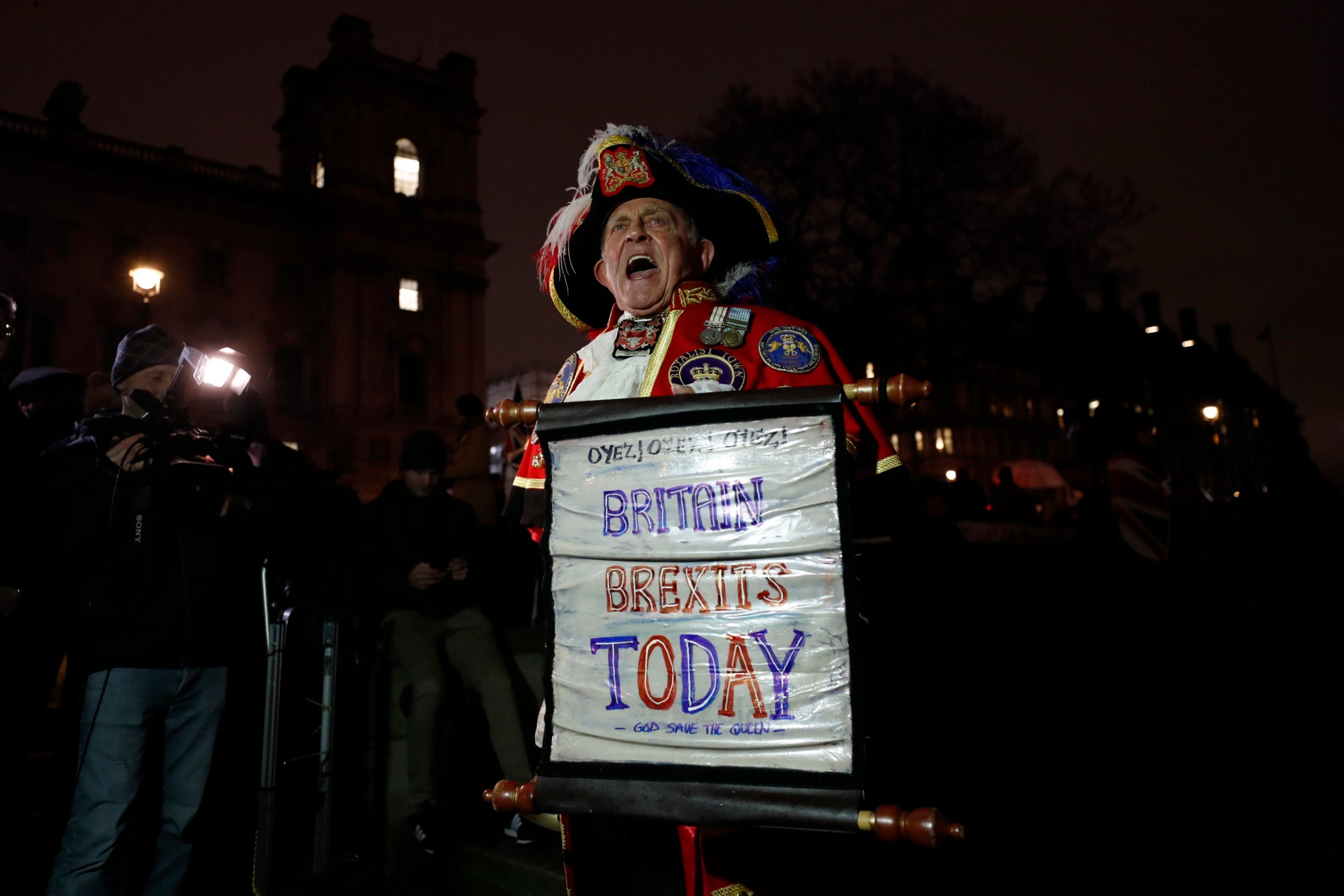
12/66
A Brexit supporter shouts during a rally in London
AP
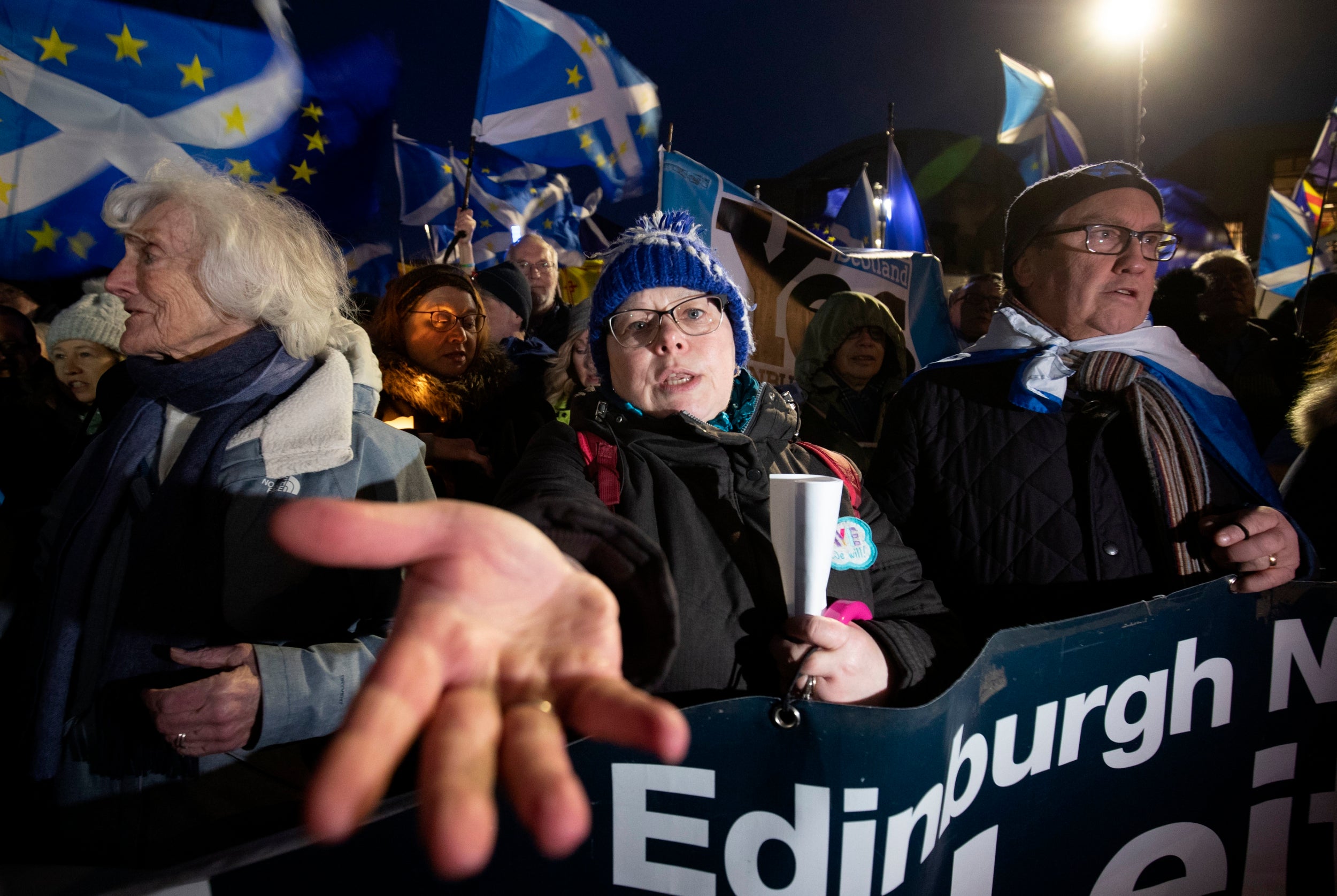
13/66
Pro-EU campaigners outside the Scottish Parliament, Edinburgh
PA

14/66
Pro-EU campaigners take part in a ‘Missing EU Already’ rally outside the Scottish Parliament, Edinburgh
PA
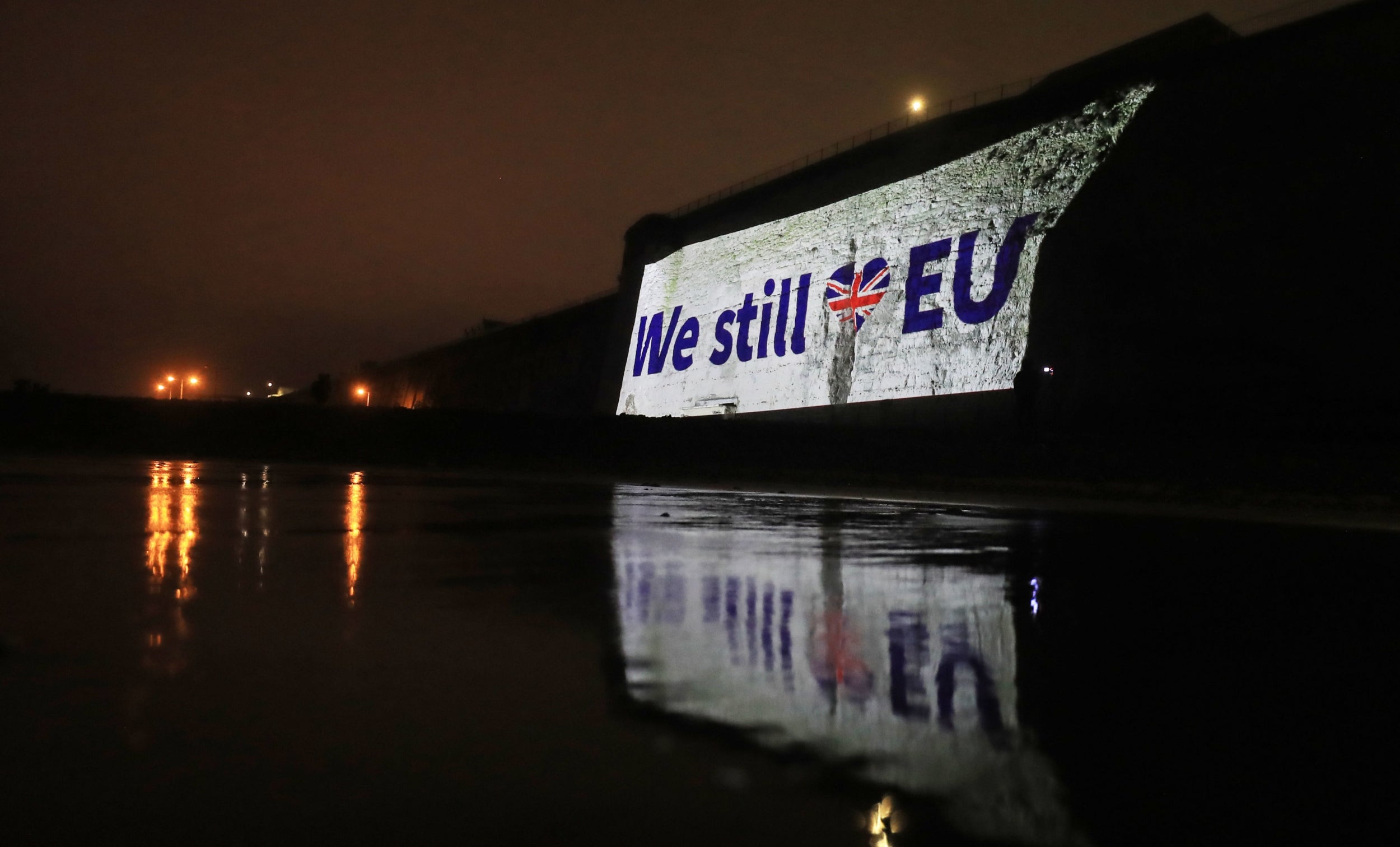
15/66
A large pro-EU banner is projected onto Ramsgate cliff in Kent
PA

16/66
Pro-EU supporters light candles in Smith Square in Westminster
PA

17/66
A man waves Union flags from a small car as he drives past Brexit supporters gathering in Parliament Square
AFP via Getty Images
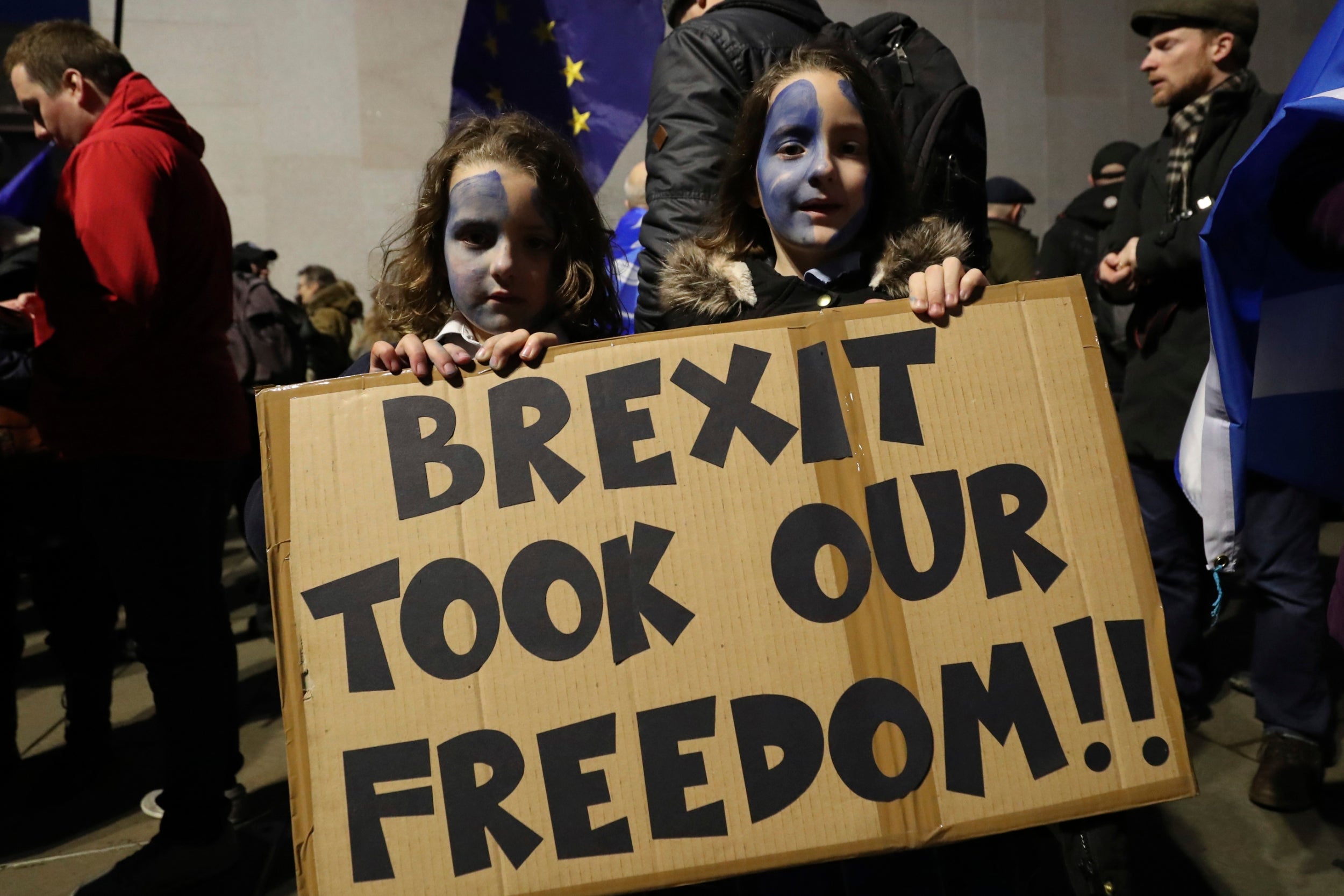
18/66
The five-year old Elisa Saemann, left, and her seven-year old sister Katie hold a placard during a rally by anti-Brexit protesters outside the Scottish parliament in Edinburgh
AP
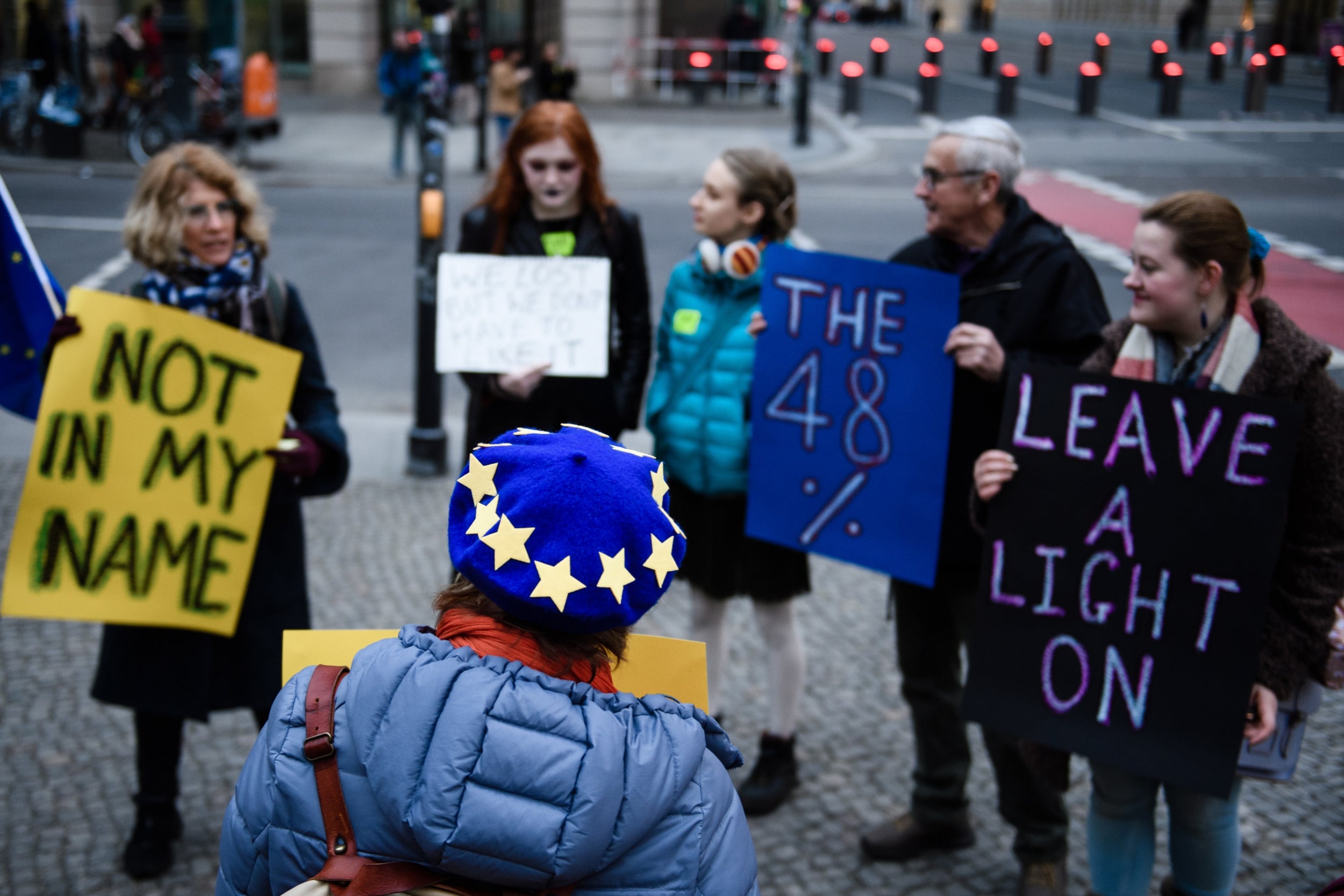
19/66
Pro Europe supporters gather on Brexit day near the British embassy in Berlin, Germany
EPA

20/66
Anti-Brexit protester hugs a man while holding a placard
REUTERS
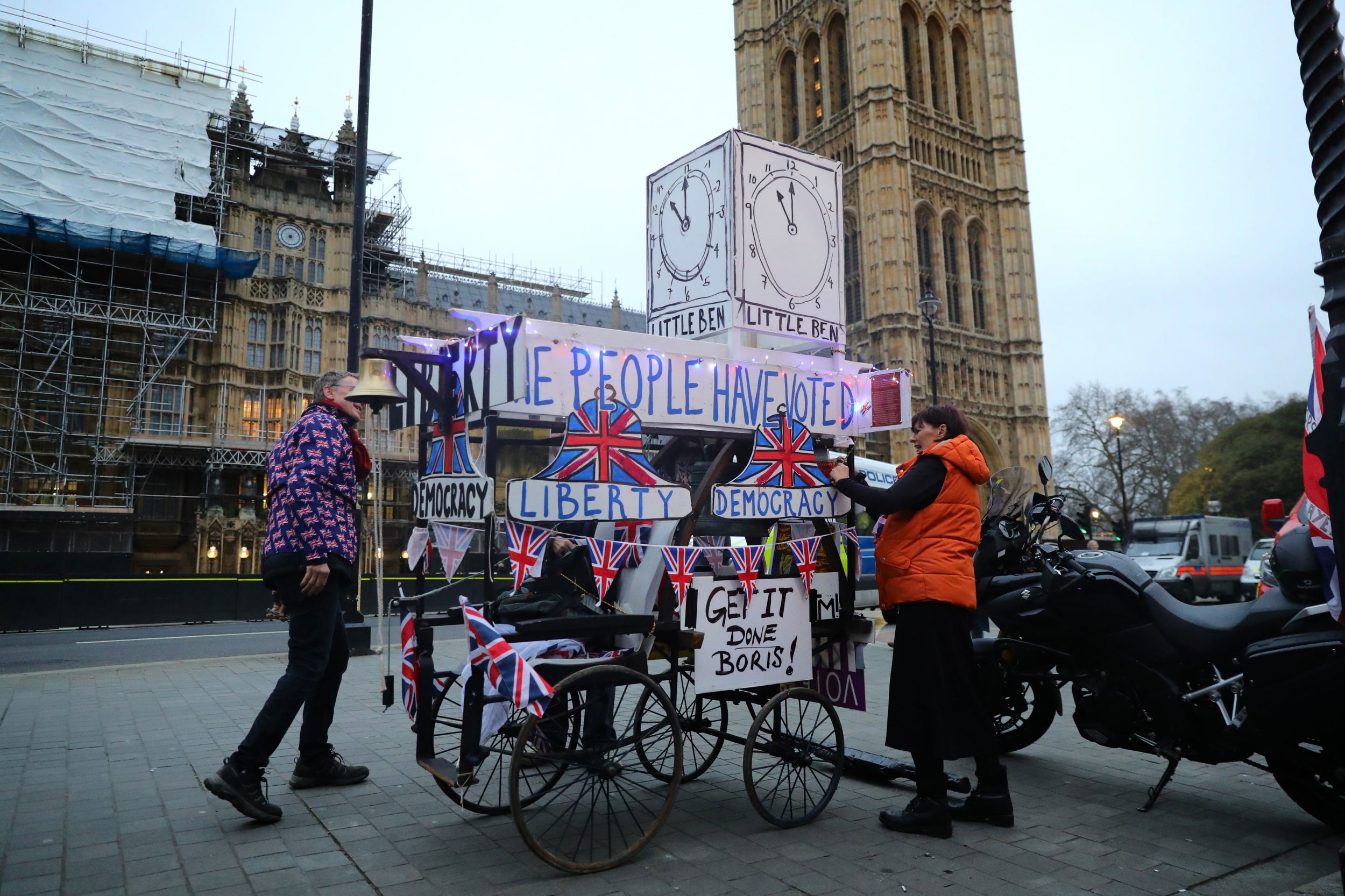
21/66
A decorated, old fashioned fire pump in Parliament Square
PA

22/66
Pro Brexit Elvis impersonator performs at Parliament Square
Getty Images
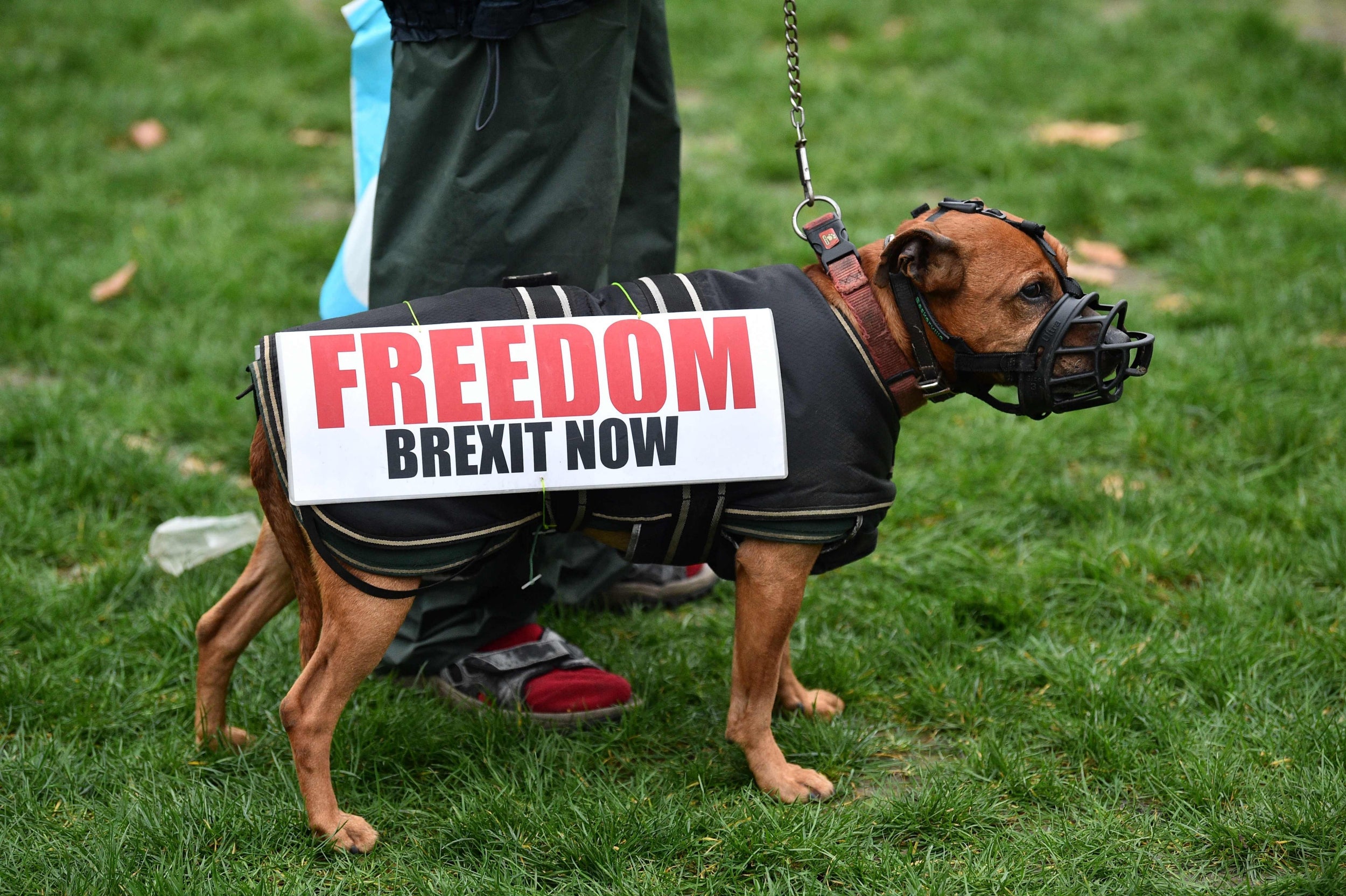
23/66
An anti-Brexiteers stands with his dog in Parliament Square
AFP via Getty Images
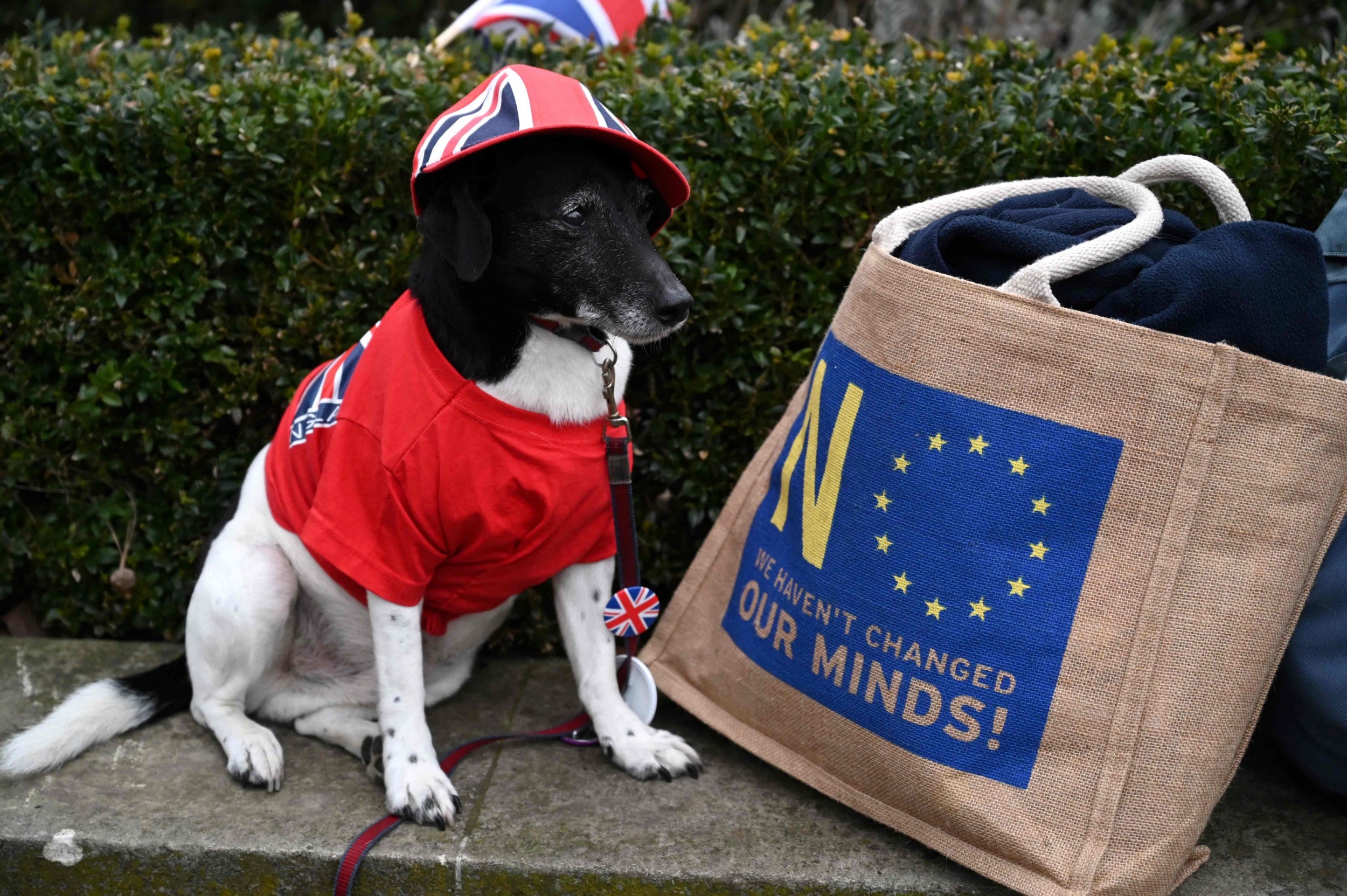
24/66
Paddy from Bournemouth wears Union colours as he sits next to an EU flag decorated bag in Parliament Square
AFP via Getty Images

25/66
A pro-EU activist plays a guitar decorated with the EU flag during a protest organised by civil rights group New Europeans outside Europe House, central London
AFP via Getty Images
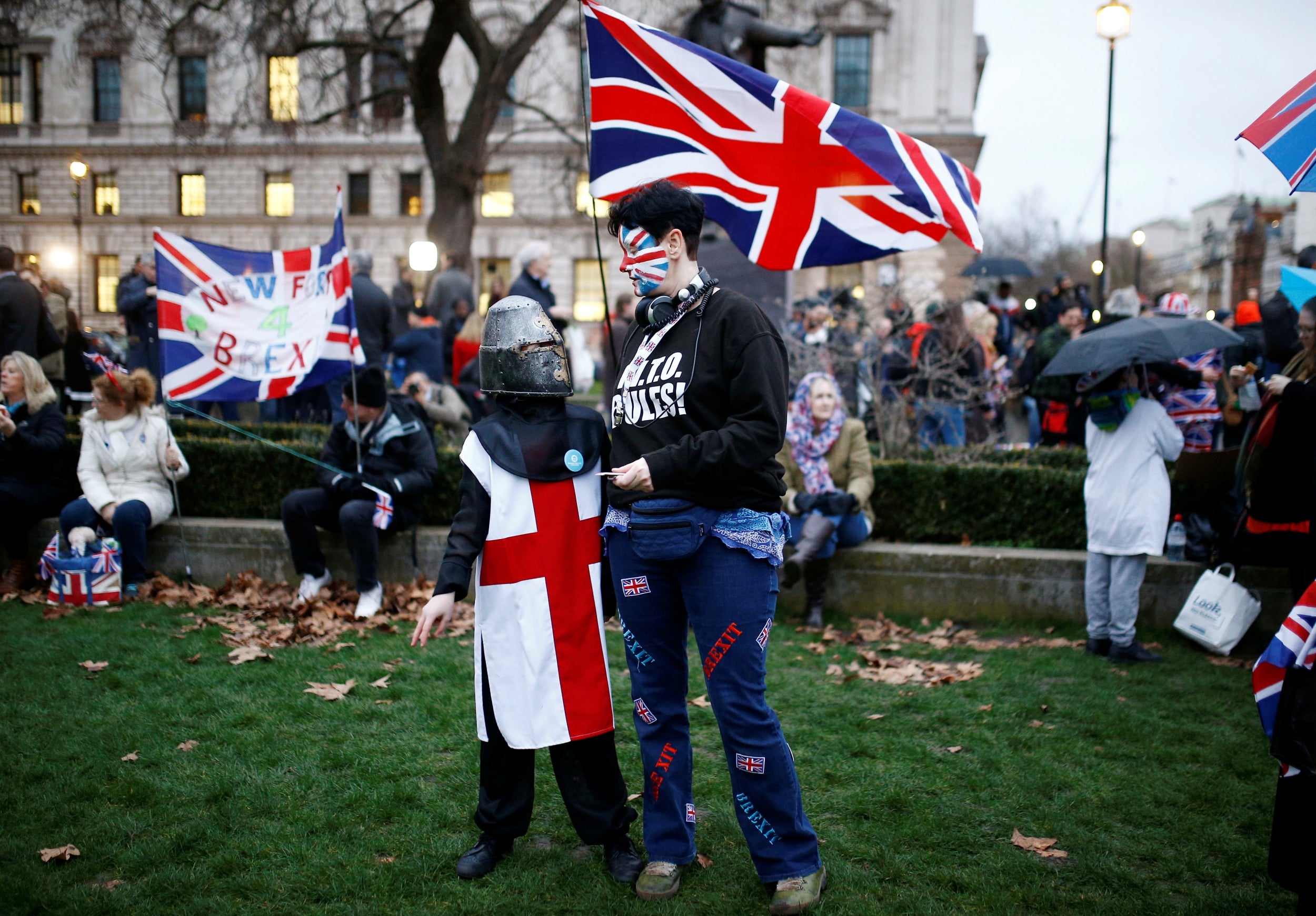
26/66
People celebrate Britain leaving the EU
REUTERS
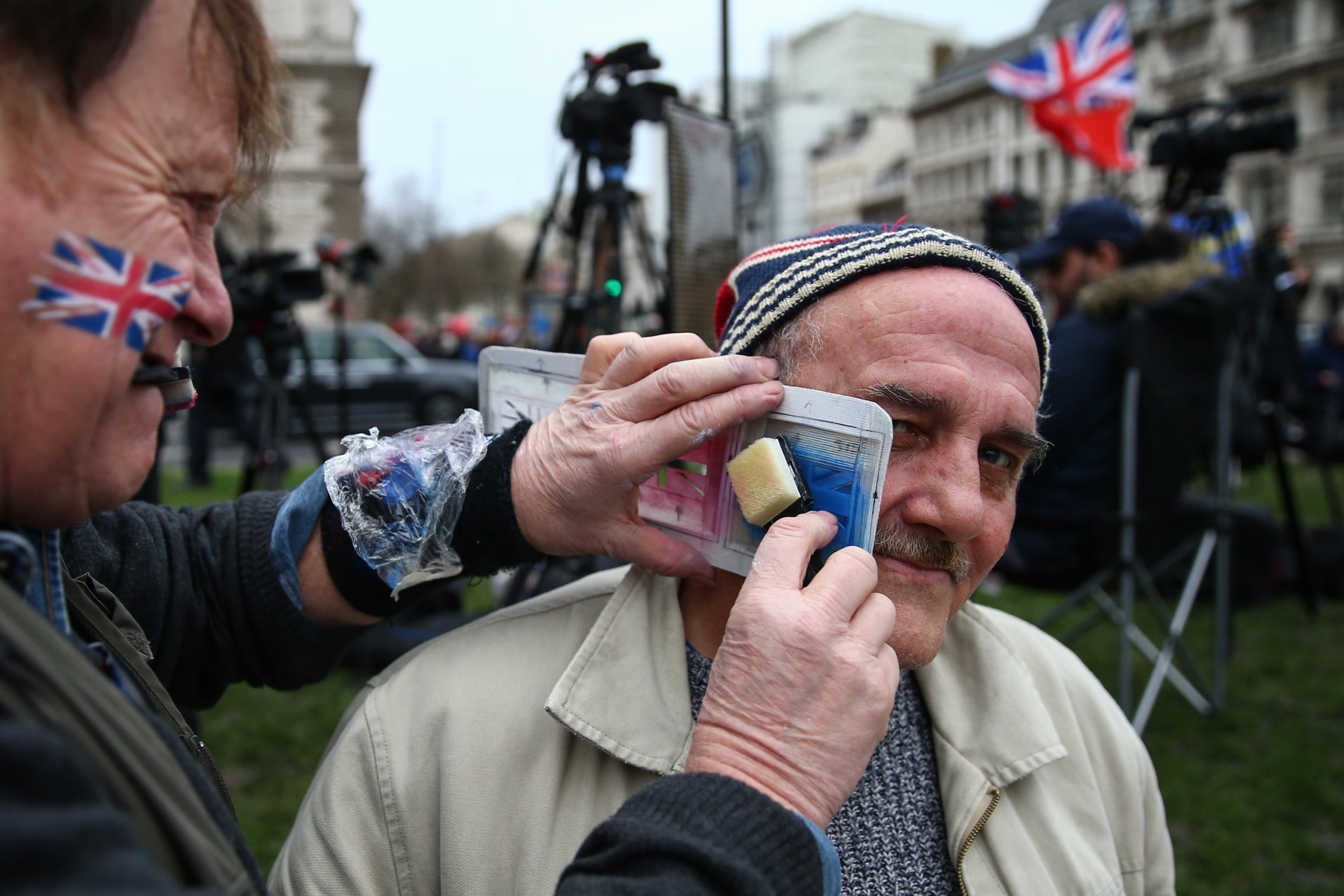
27/66
A Pro Brexit supporter has a Union Jack painted onto his face at Parliament Square
Getty Images
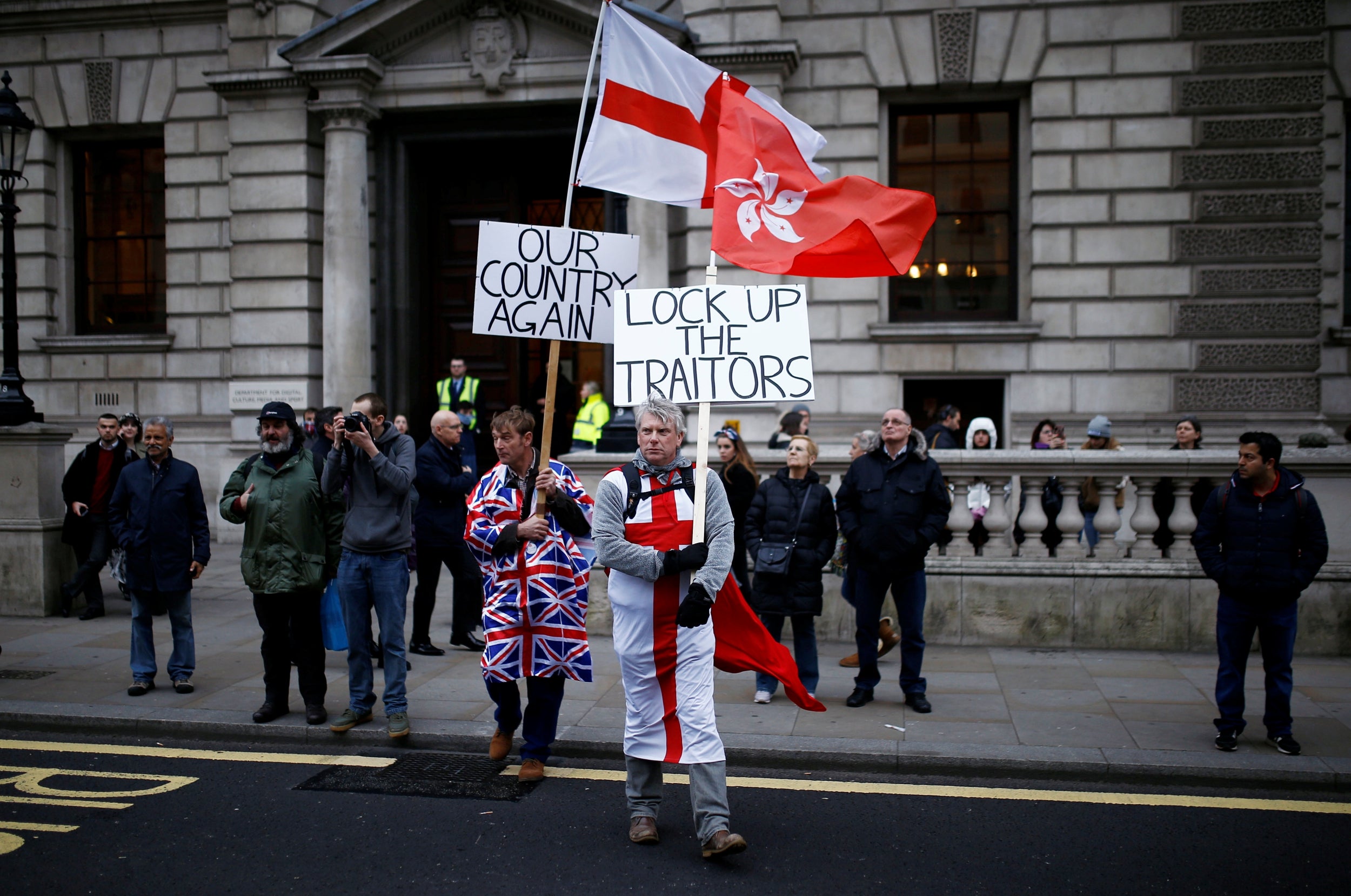
28/66
Men hold placards celebrating Britain leaving the EU
REUTERS

29/66
Pro Brexit supporters dance in the street draped with Union Jack flags at Parliament Square
Getty Images
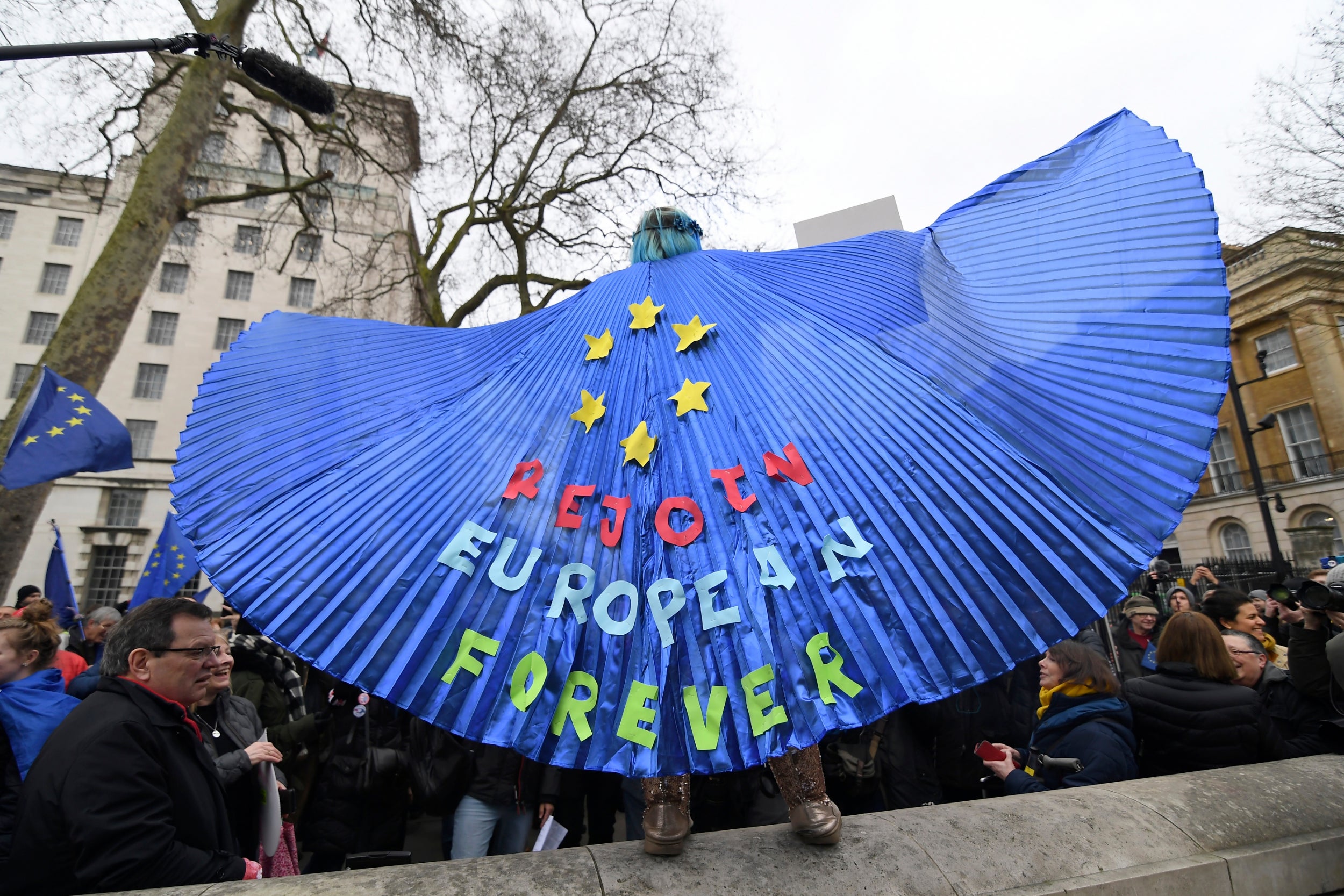
30/66
An anti-Brexit demonstrator spreads his wings during a gathering near Downing Street
AP

31/66
Pro EU supporters display a banner ‘ Here to Stay, Here to Fight, Migrants In, Tories Out’ from Westminster bridge
EPA

32/66
Pro-Brexit supporters burn European Union flags at Parliament Square
Getty
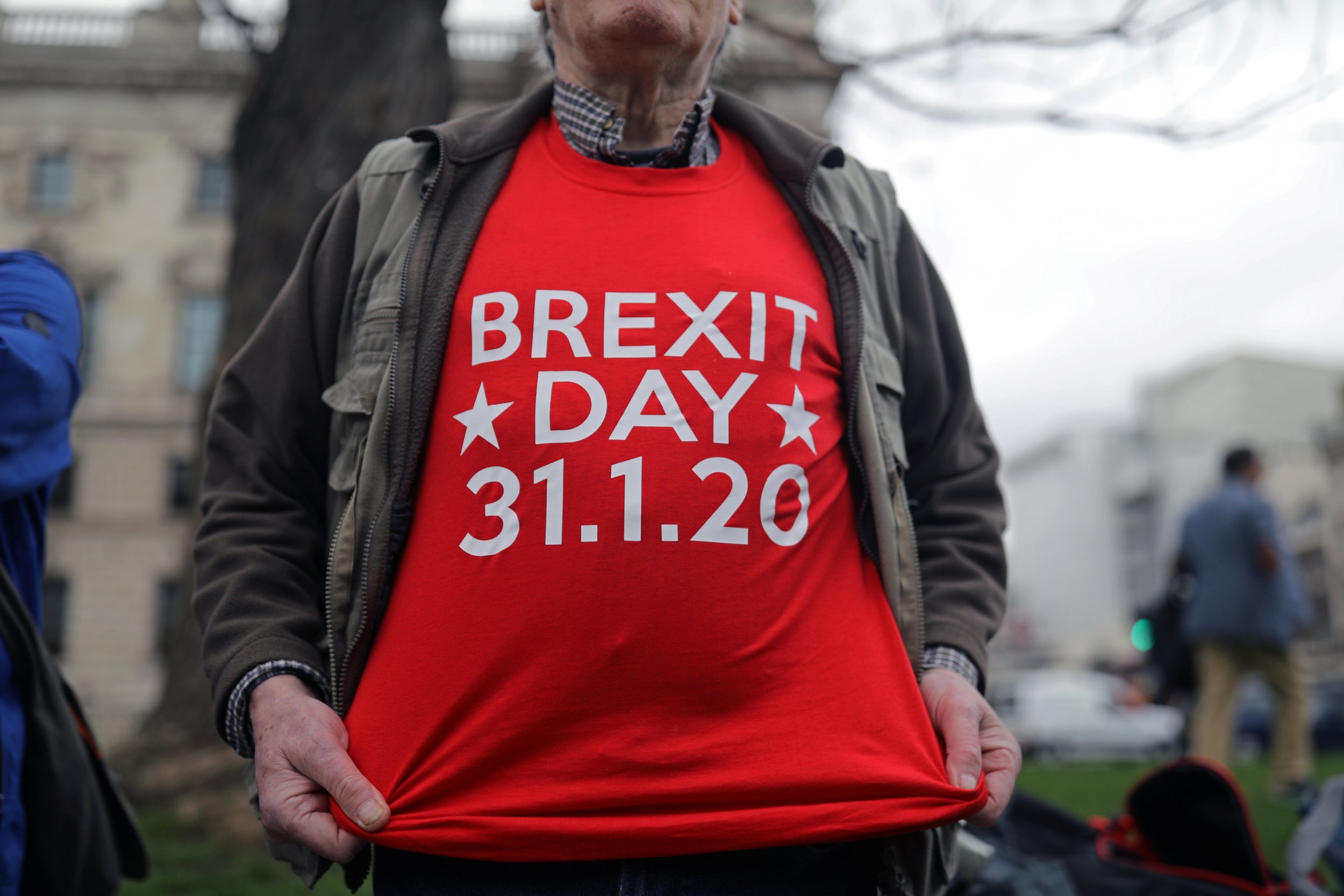
33/66
A man poses for a picture on Parliament Square in a ‘Brexit Day’ t-shirt
Reuters
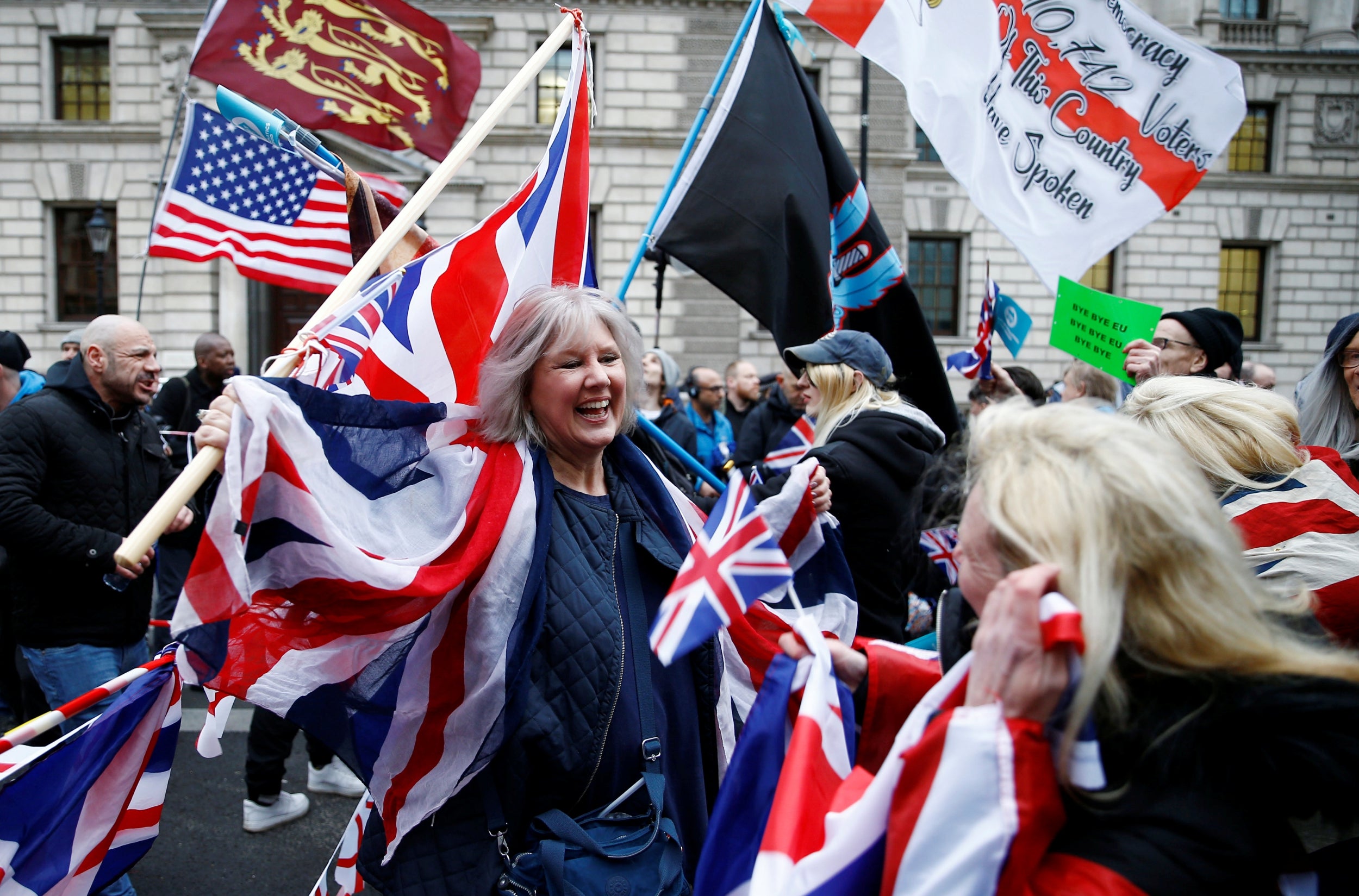
34/66
People celebrate Britain leaving the EU
Reuters
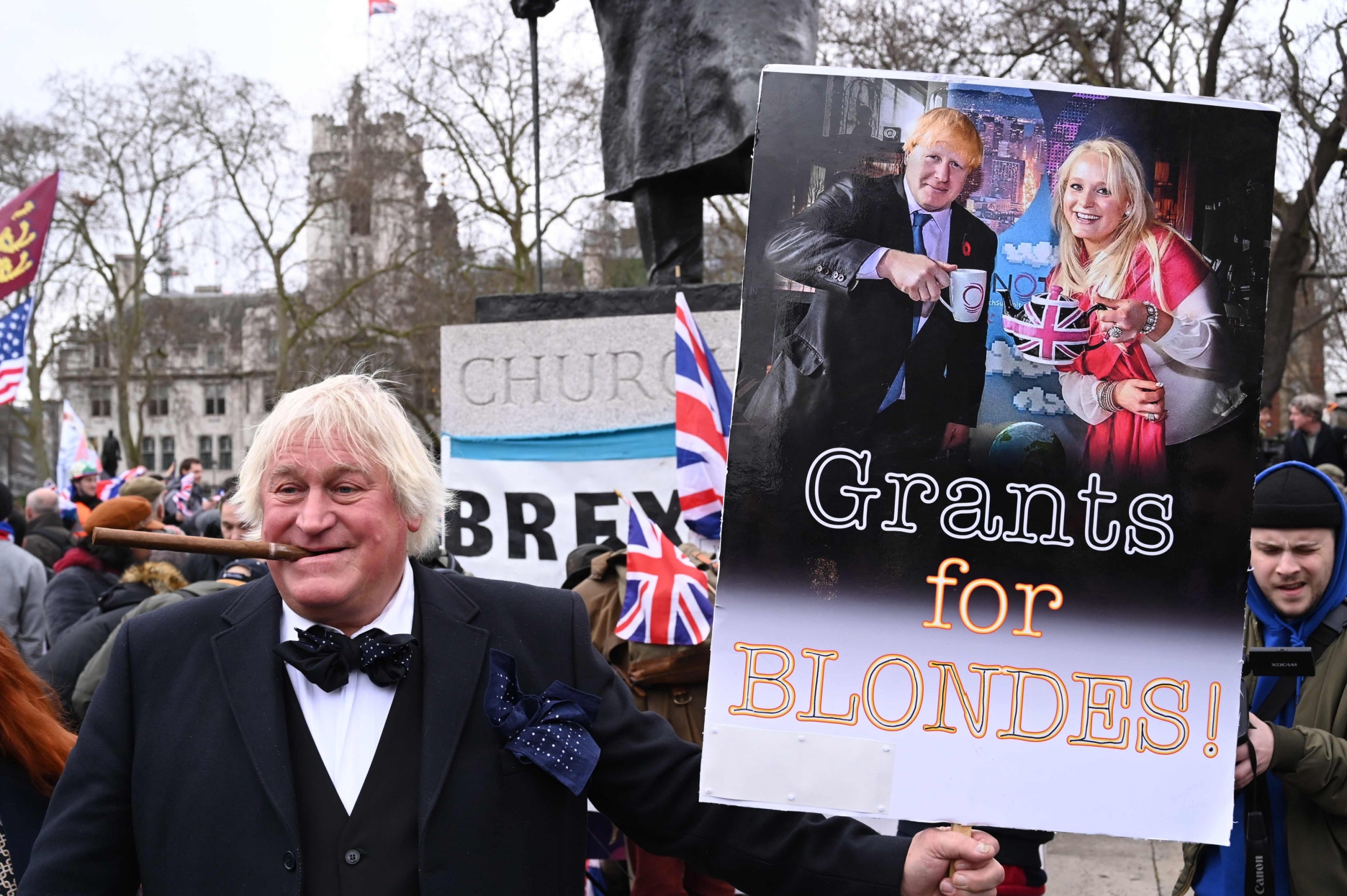
35/66
AFP via Getty
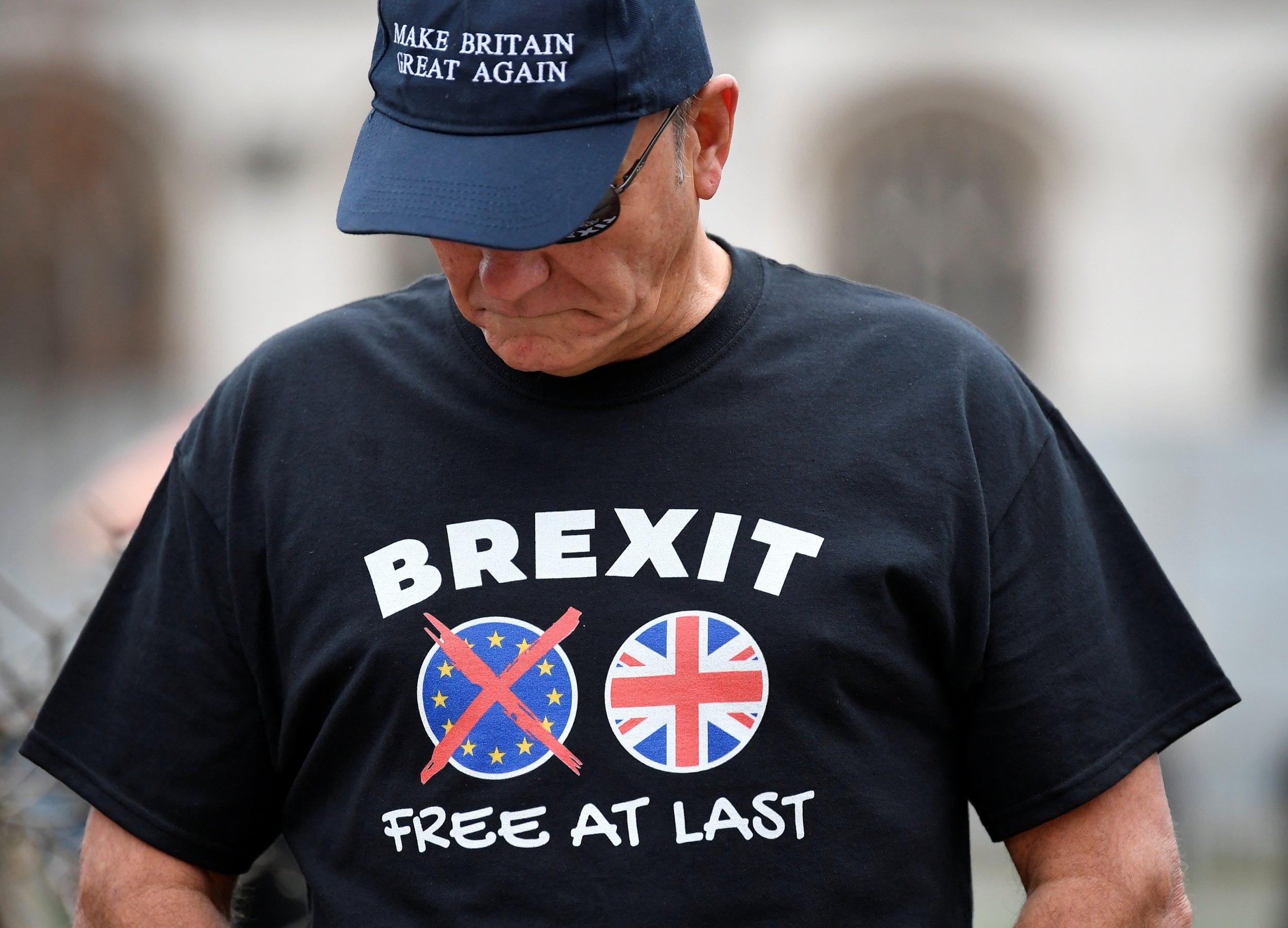
36/66
A man wears a pro-Brexit t-shirt
Reuters
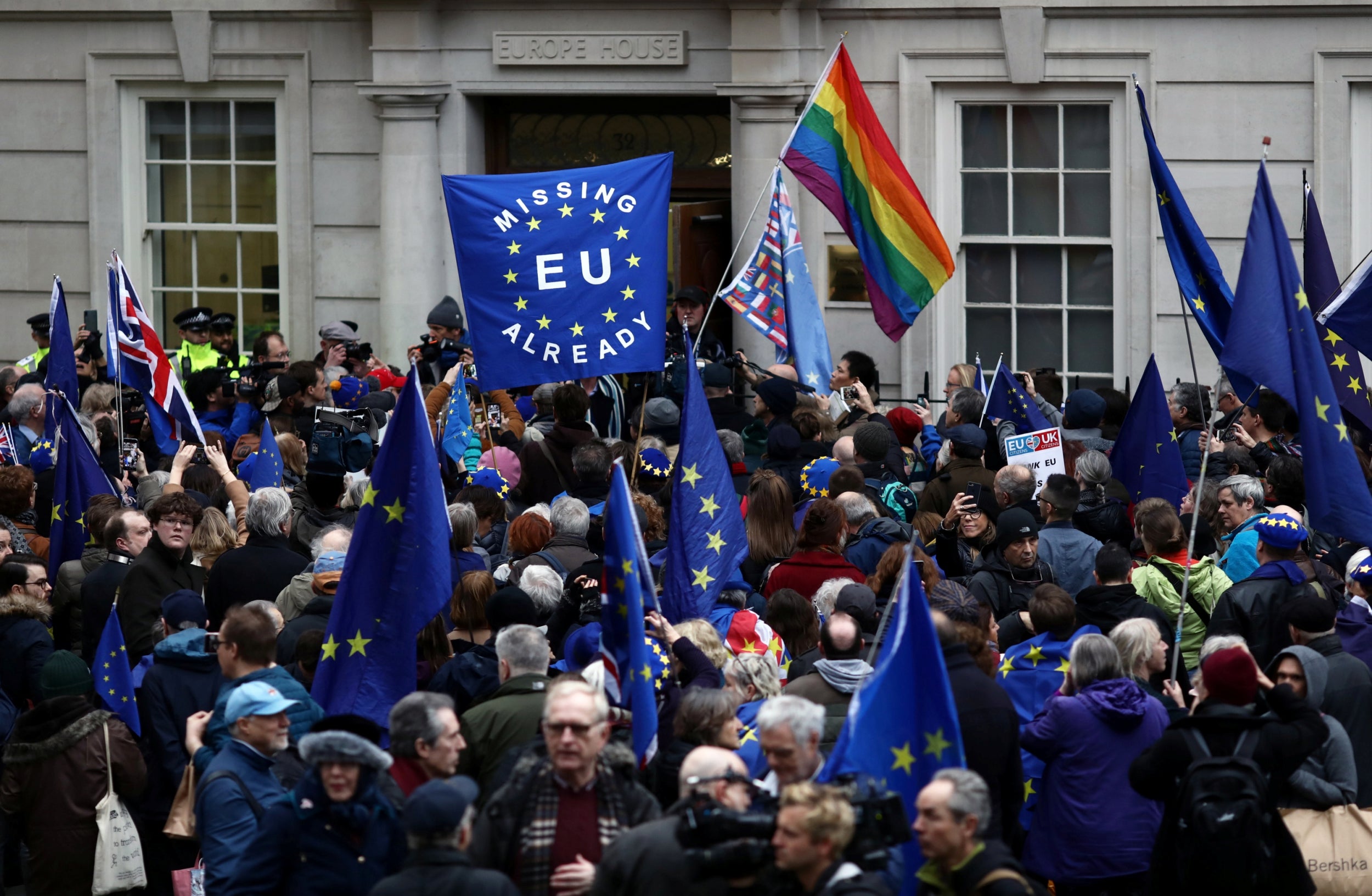
37/66
Anti-Brexit demonstrators visit Europe House to give flowers to the staff on Brexit day
Reuters

38/66
Pro Brexit supporter wears a novelty Union Jack top hat outside the Houses of Parliament
Getty Images

39/66
Customers Scott Jones and Laura Jones at the Sawmill Bar in South Elmsall, Yorkshire, where a Brexit party is being held throughout the day
PA
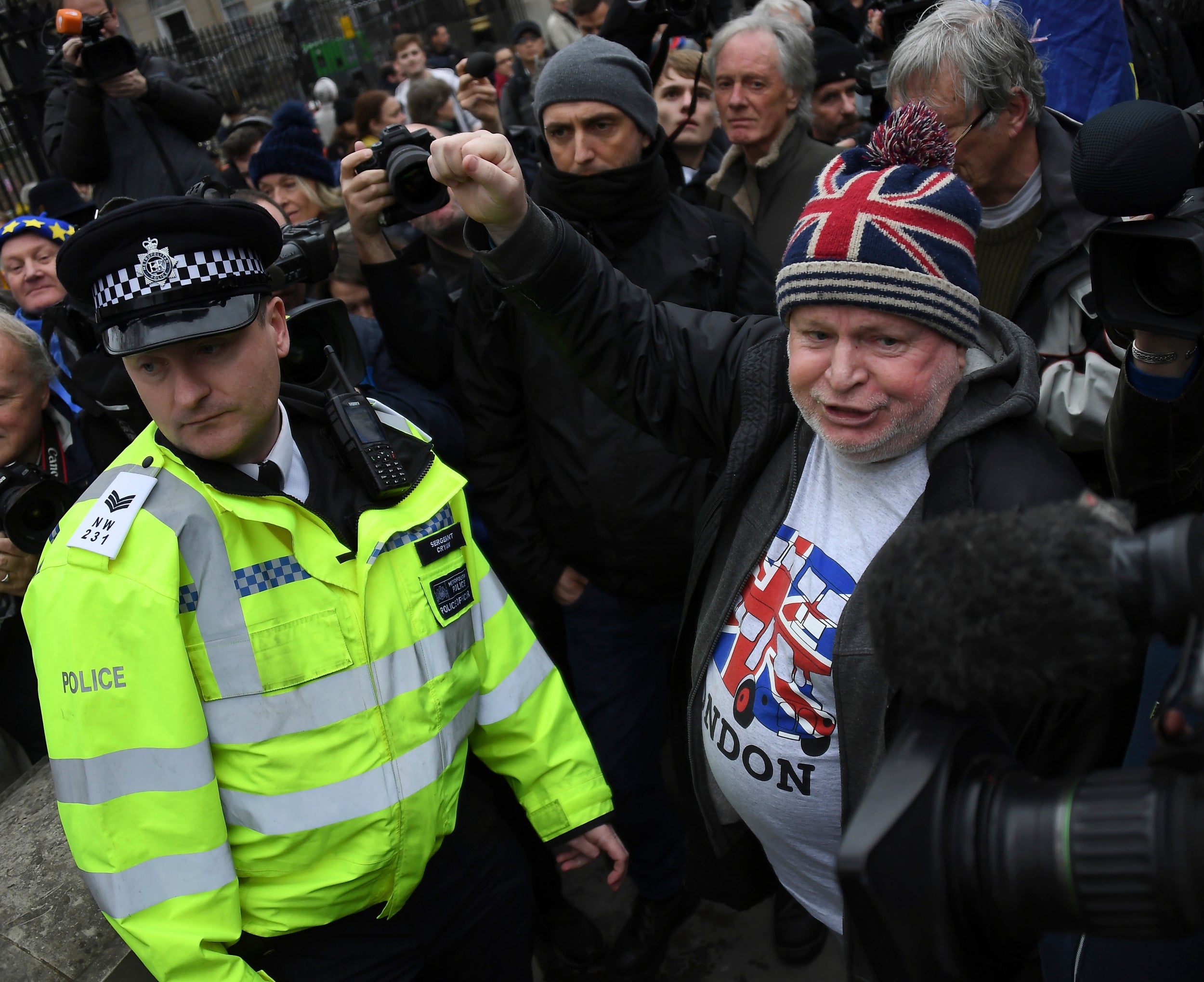
40/66
AP
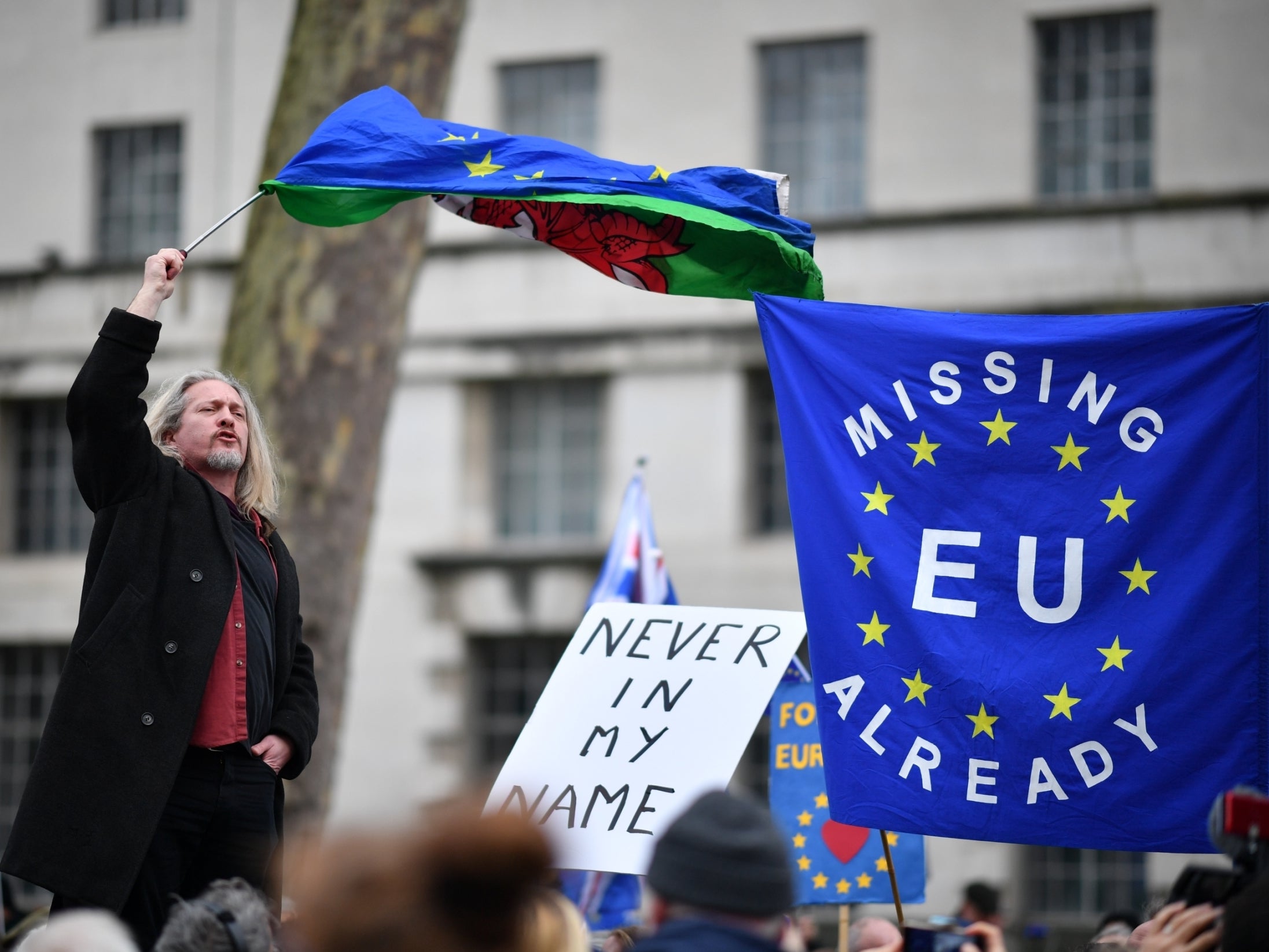
41/66
Getty

42/66
Getty Images
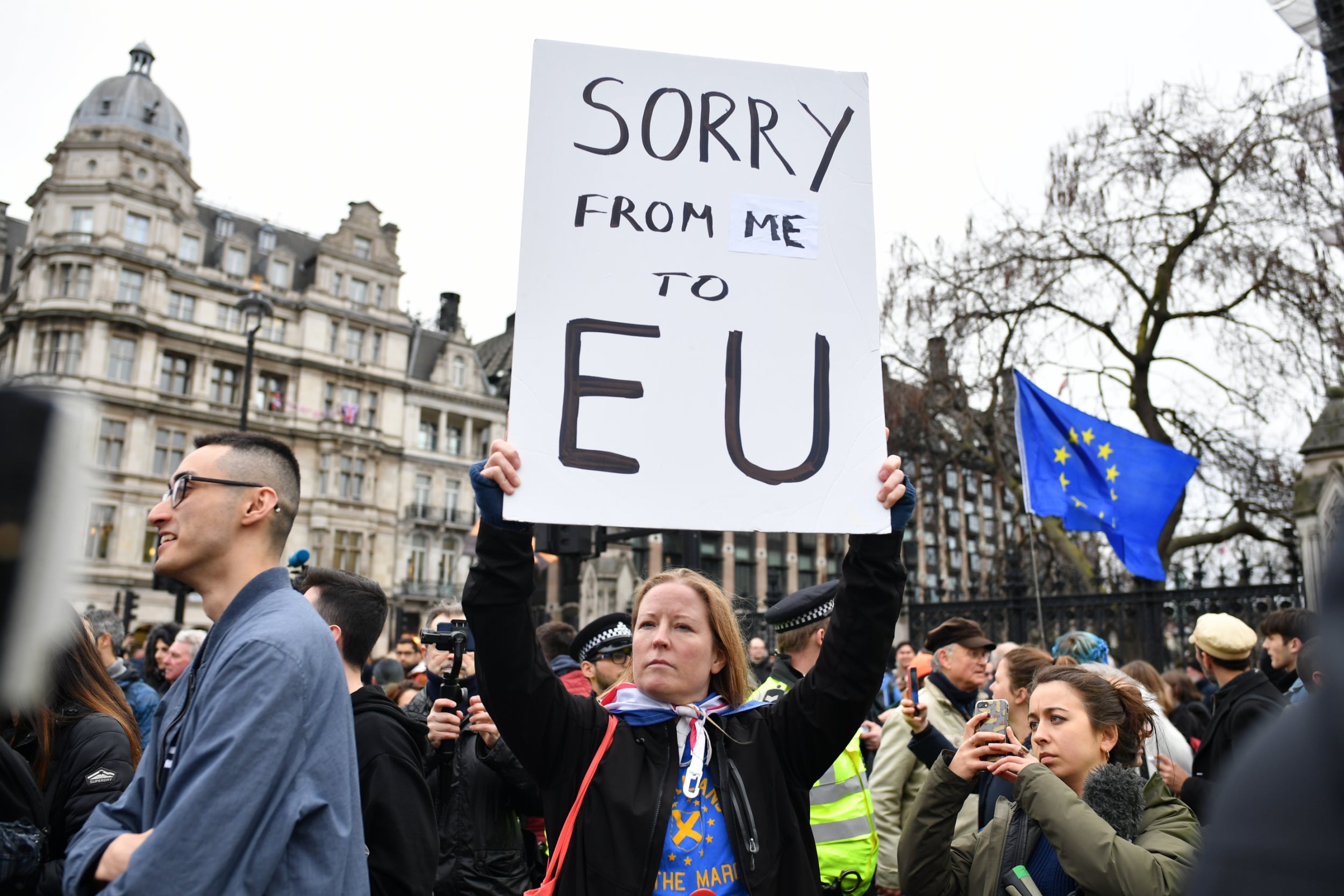
43/66
Pro-EU activists protest
Getty Images
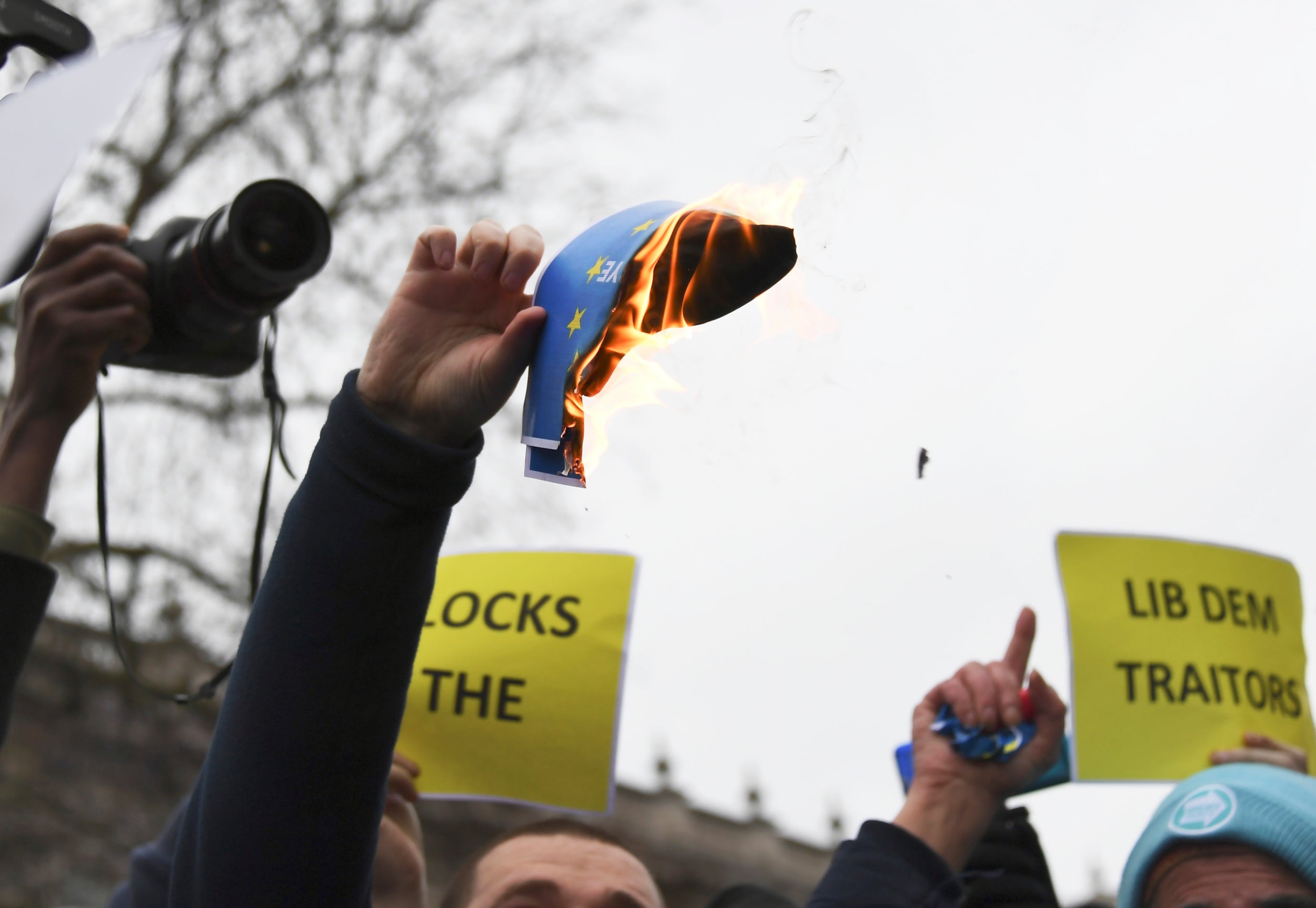
44/66
A pro-Brexit demonstrator burns a European Union flag
AP
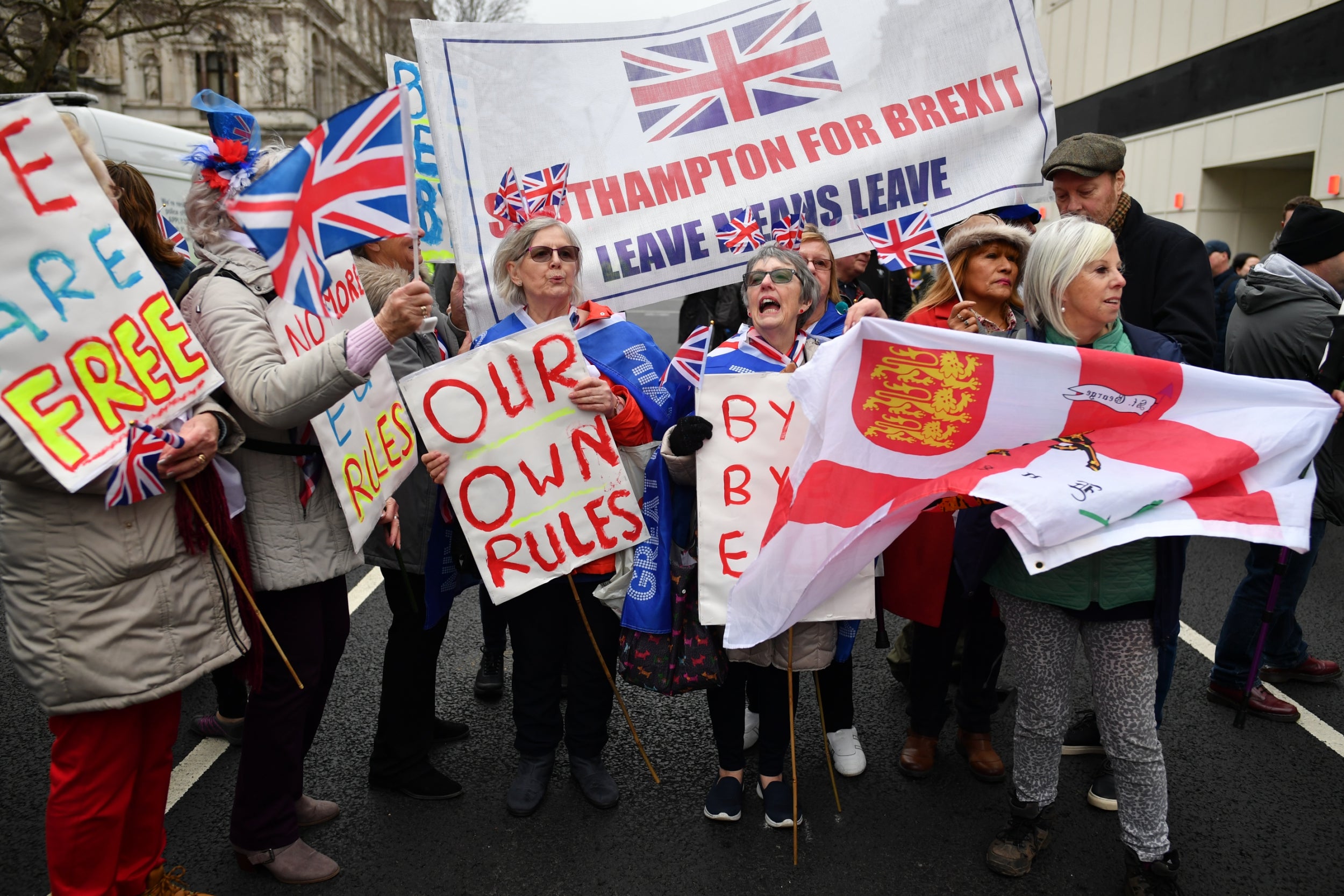
45/66
Pro Brexit supporters
Getty Images
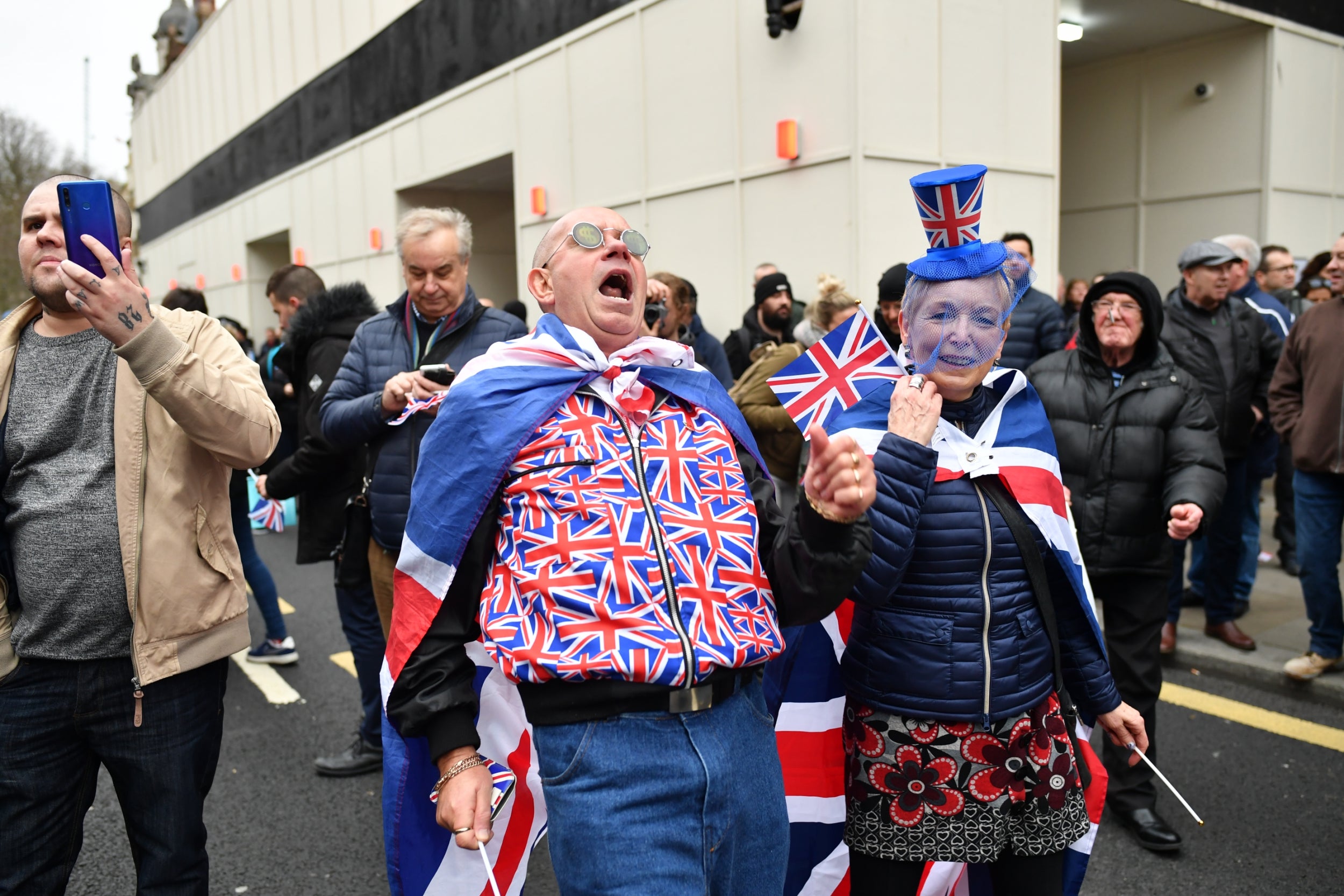
46/66
Pro Brexit supporters
Getty Images

47/66
A Brexit supports holds a sign in Parliament Square
AP
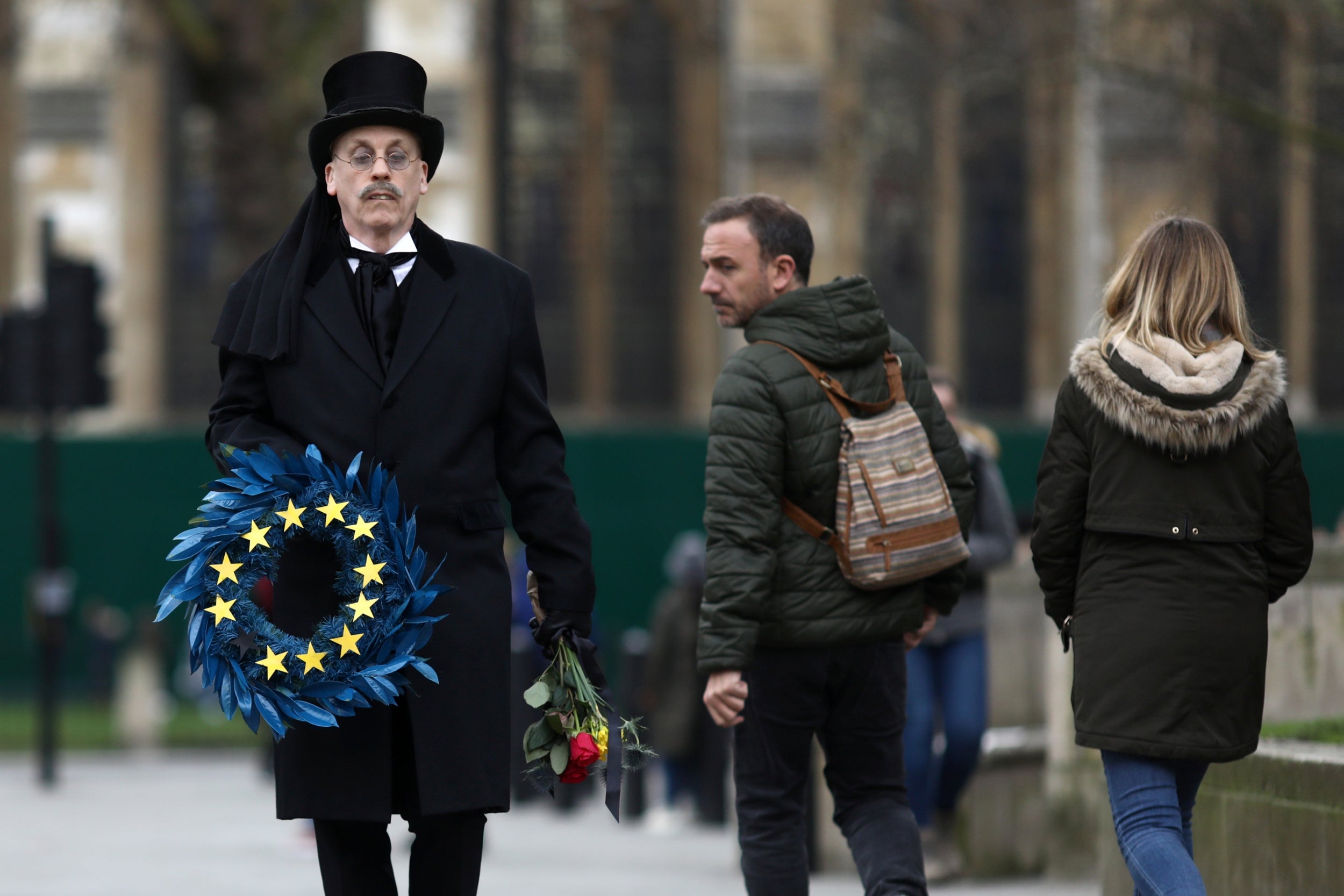
48/66
A man carries an EU themed wreath
Reuters

49/66
Ann Widdecombe reacts with other members of the Brexit party as they leave en masse from the European Parliament
PA
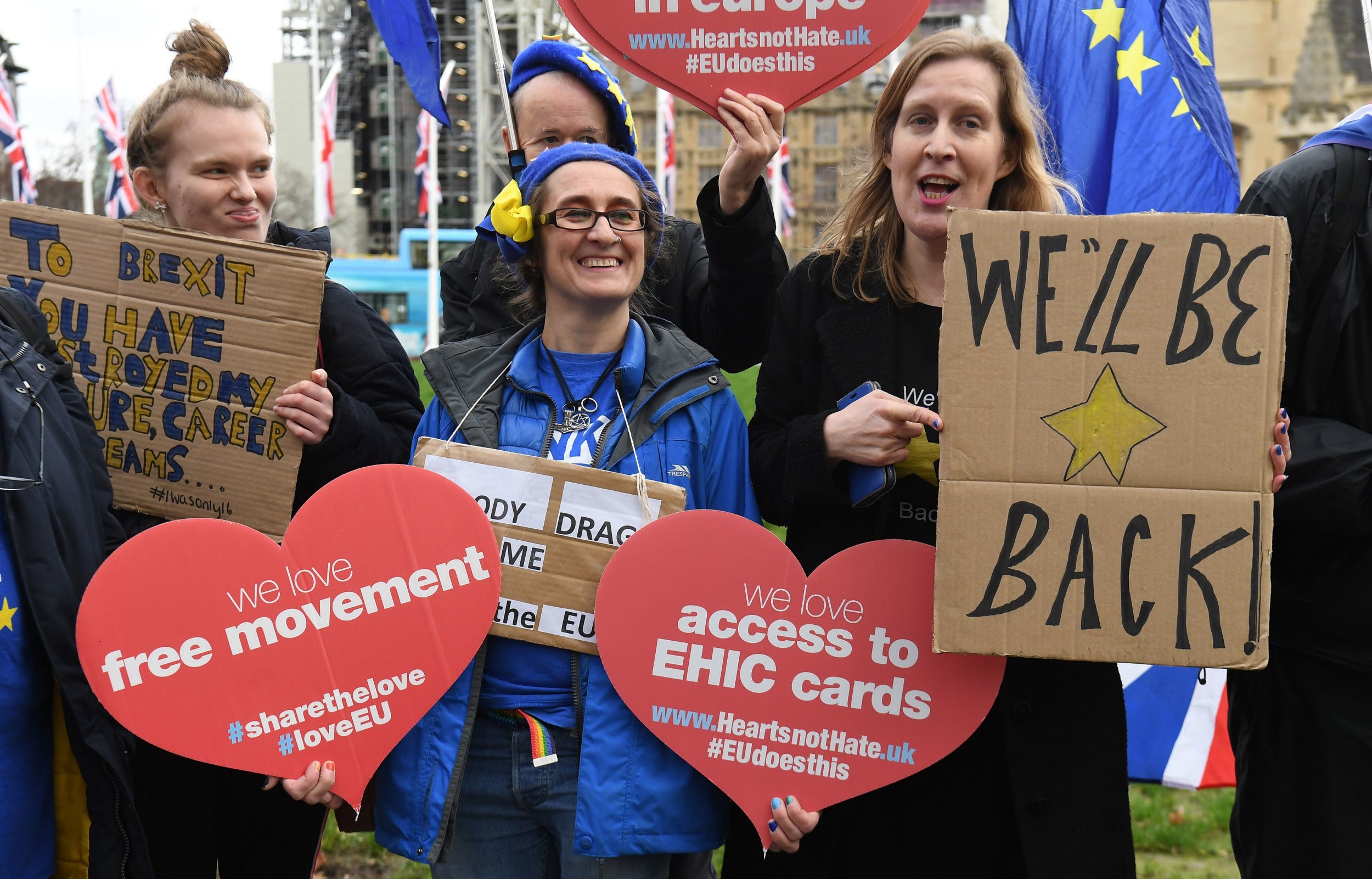
50/66
Anti-Brexit demonstrators in Parliament Square
PA

51/66
Pro EU supporters let off flares from Westminster Bridge
Getty
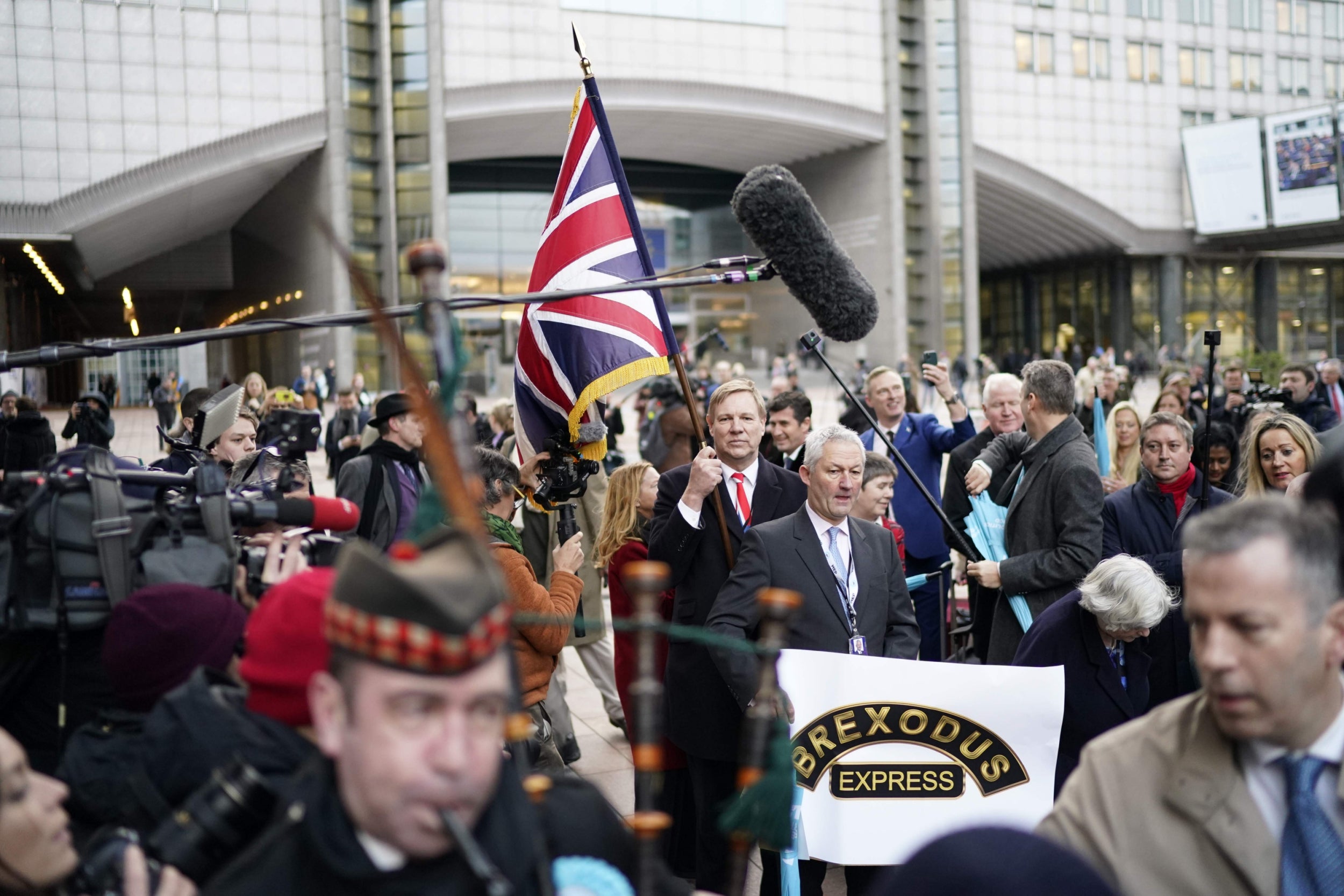
52/66
British MEPs Jonathan Bullock, holding the Union Jack flag and Jake Pugh leave the European Parliament, in Brussels on the Brexit day
AFP via Getty
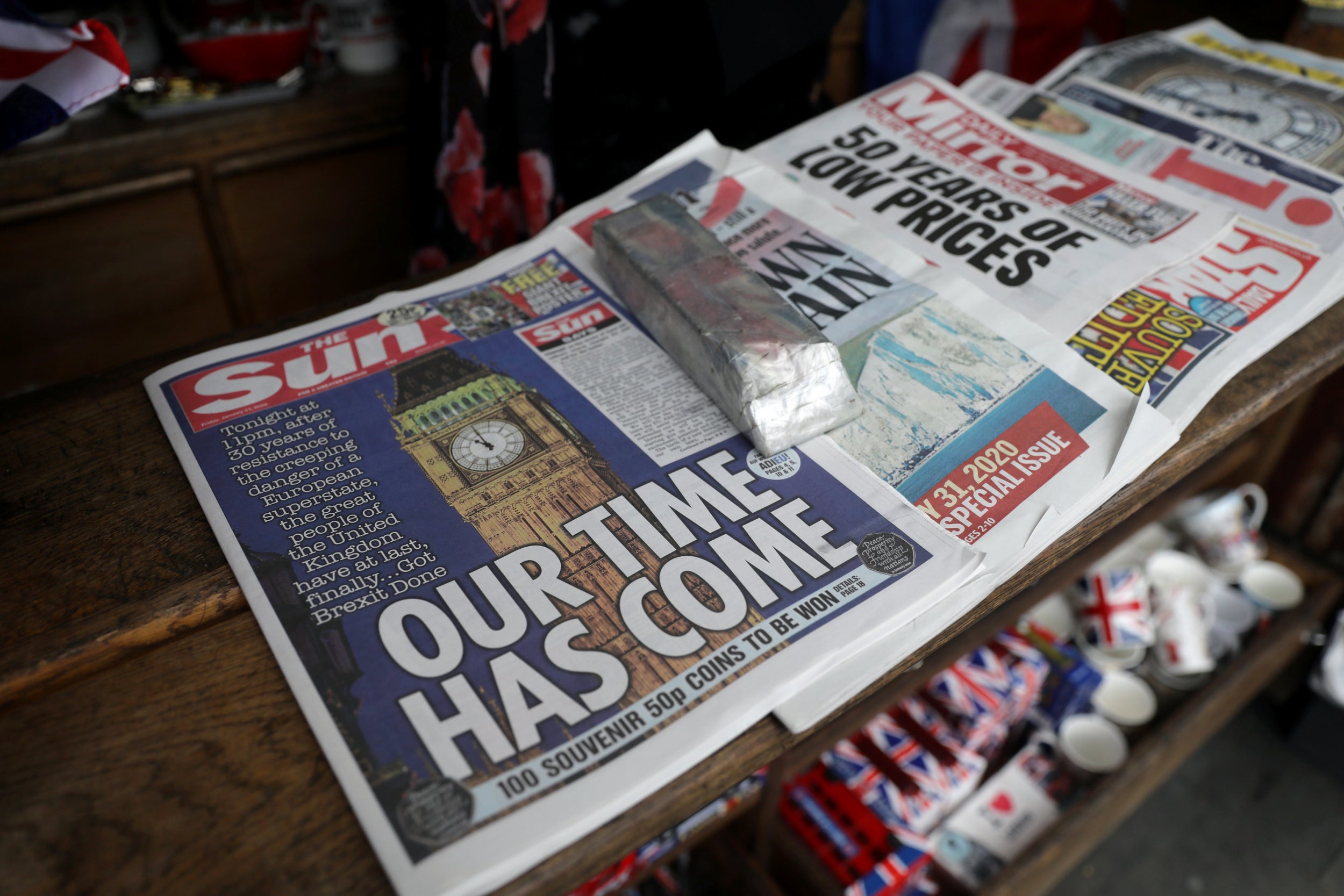
53/66
Newspapers and other souvenirs at a store, near Parliament Square
Reuters
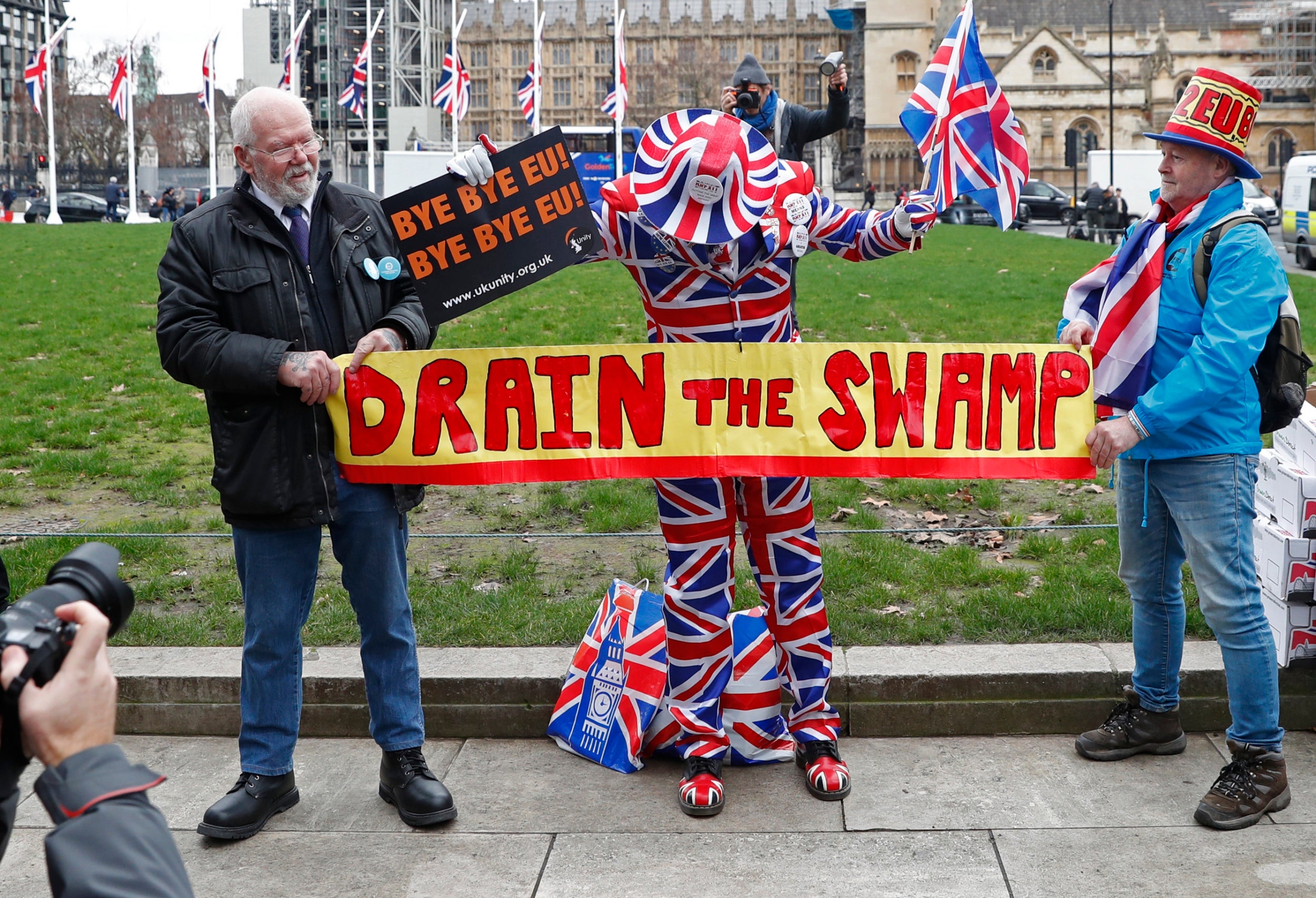
54/66
Brexit supporters hold signs in Parliament Square
AP
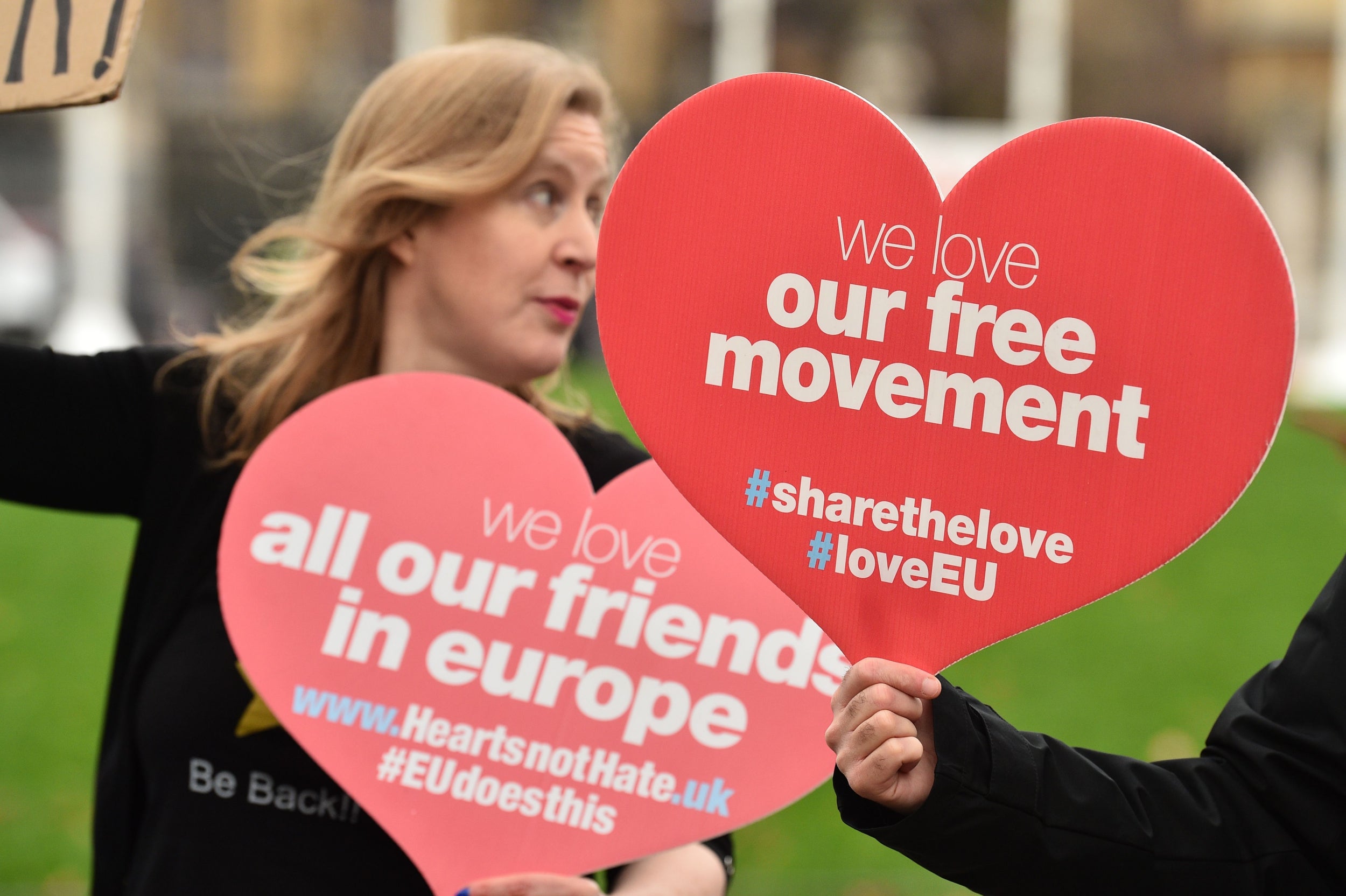
55/66
Pro-EU protesters hold placards in Parliament Square
AFP via Getty
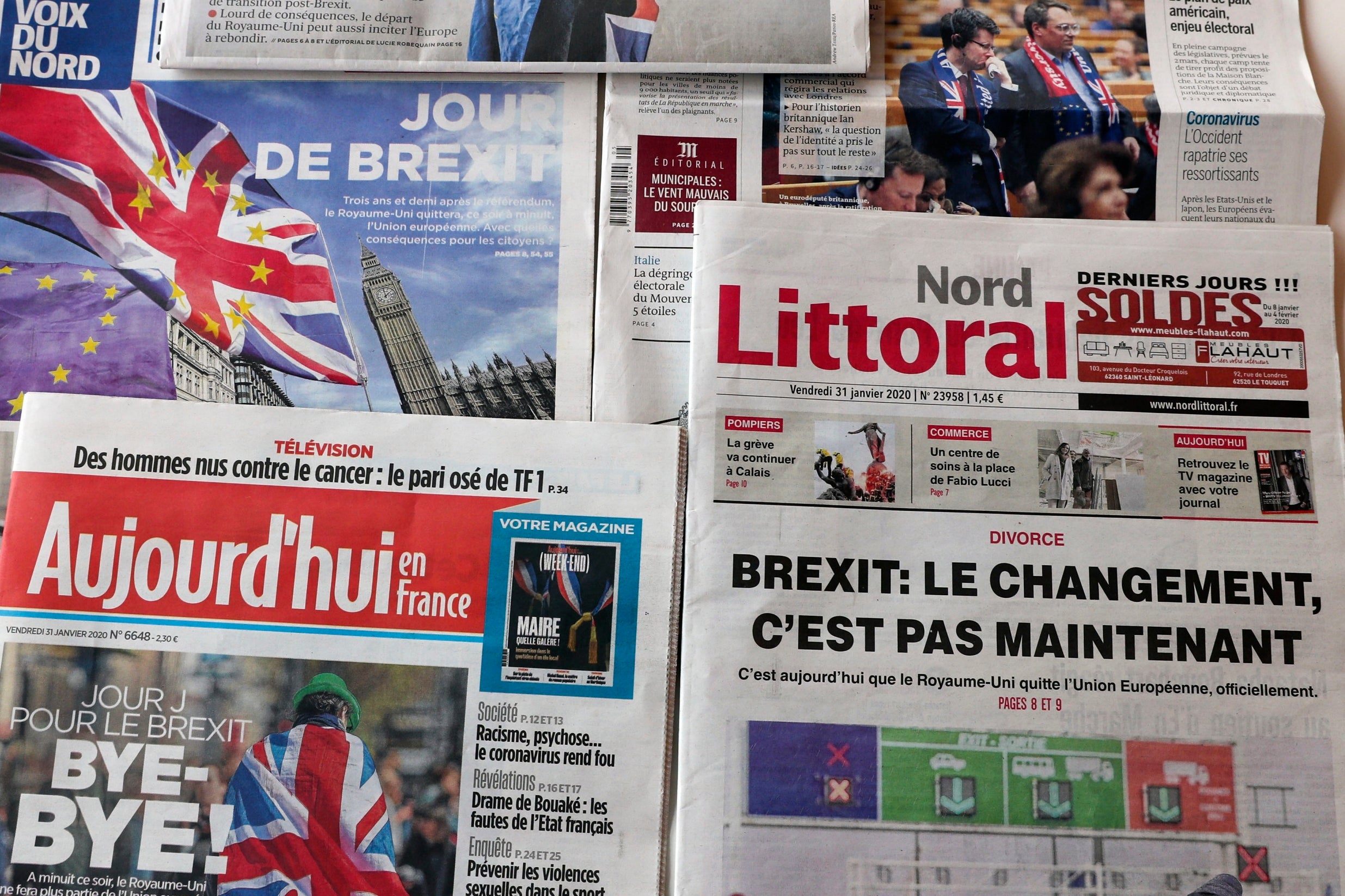
56/66
French newspapers
PA

57/66
Sinn Fein leader Mary Lou McDonald with a Border Communities Against Brexit poster before its unveiling in Carrickcarnon on the Irish border
PA

58/66
National growers organisation British Apples & Pears has renamed a British apple to EOS, the Greek goddess of dawn, to commemorate Brexit day
AP
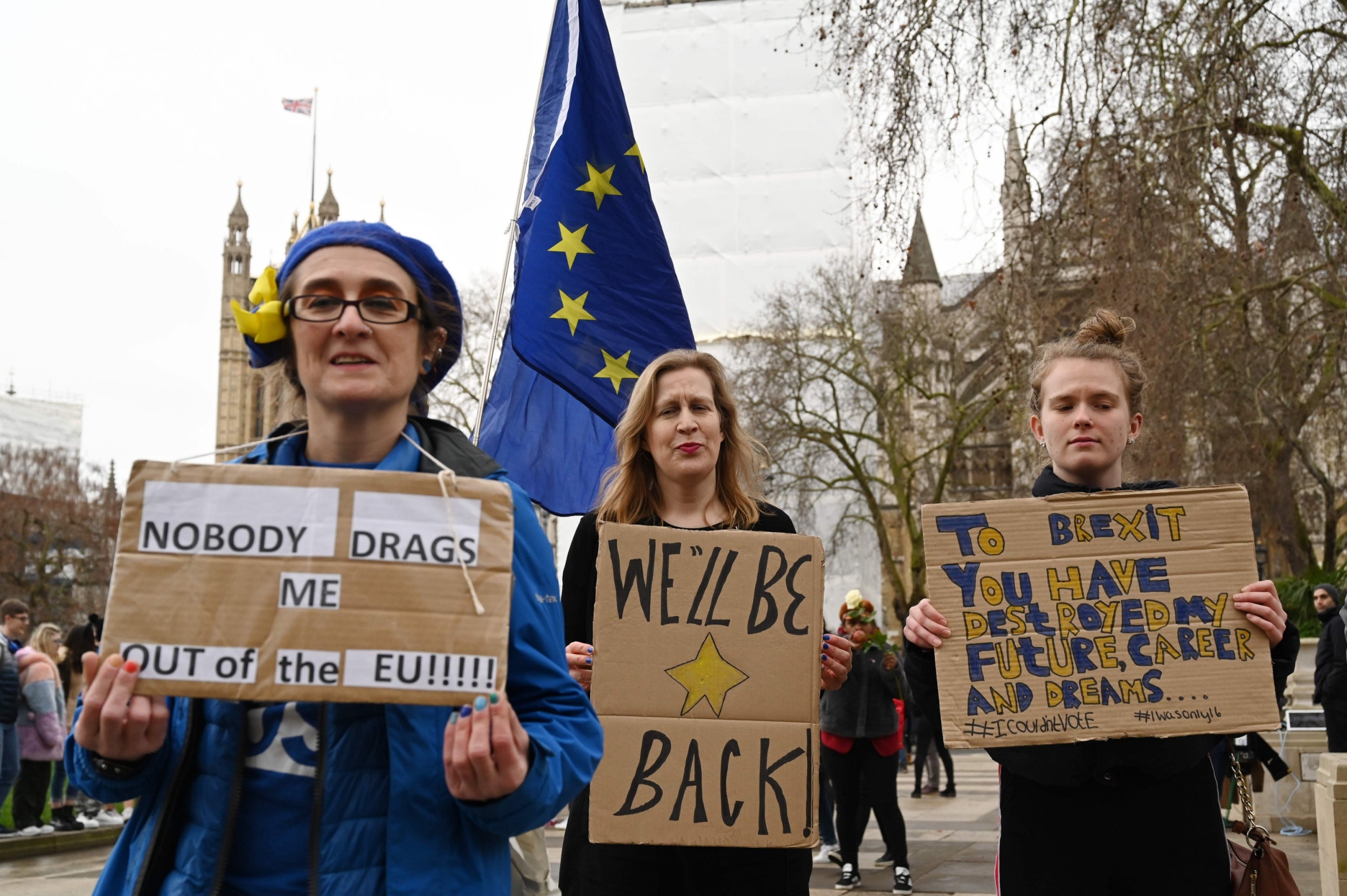
59/66
Pro-EU protesters hold placards in Parliament Square
AFP via Getty
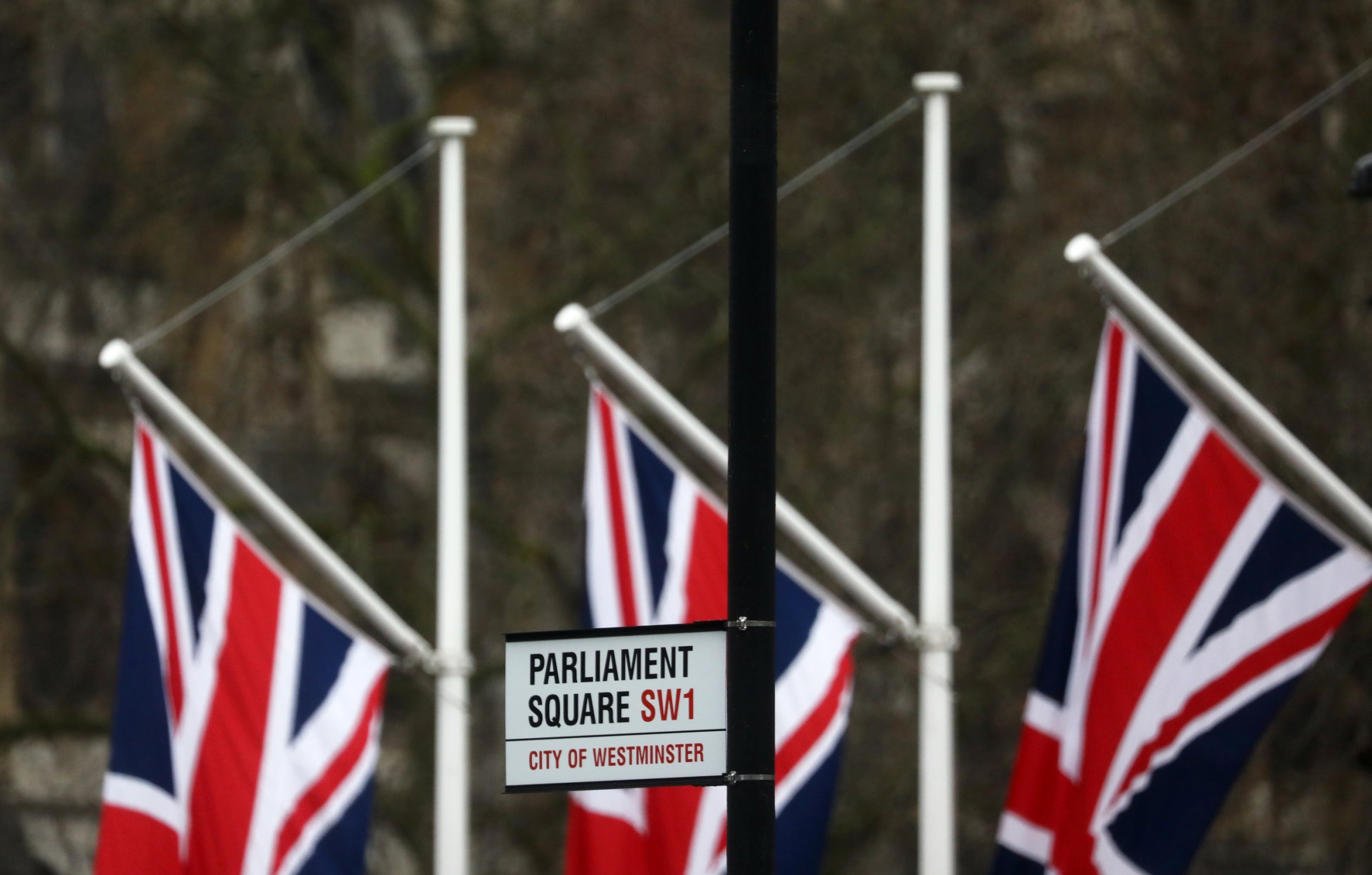
60/66
Britain’s departure from the European Union was set in law on January 29, amid emotional scenes, as the bloc’s parliament voted to ratify the divorce papers. After half a century of membership and three years of tense withdrawal talks, the UK will leave the EU at midnight Brussels time (23.00 GMT) on January 31
Reuters
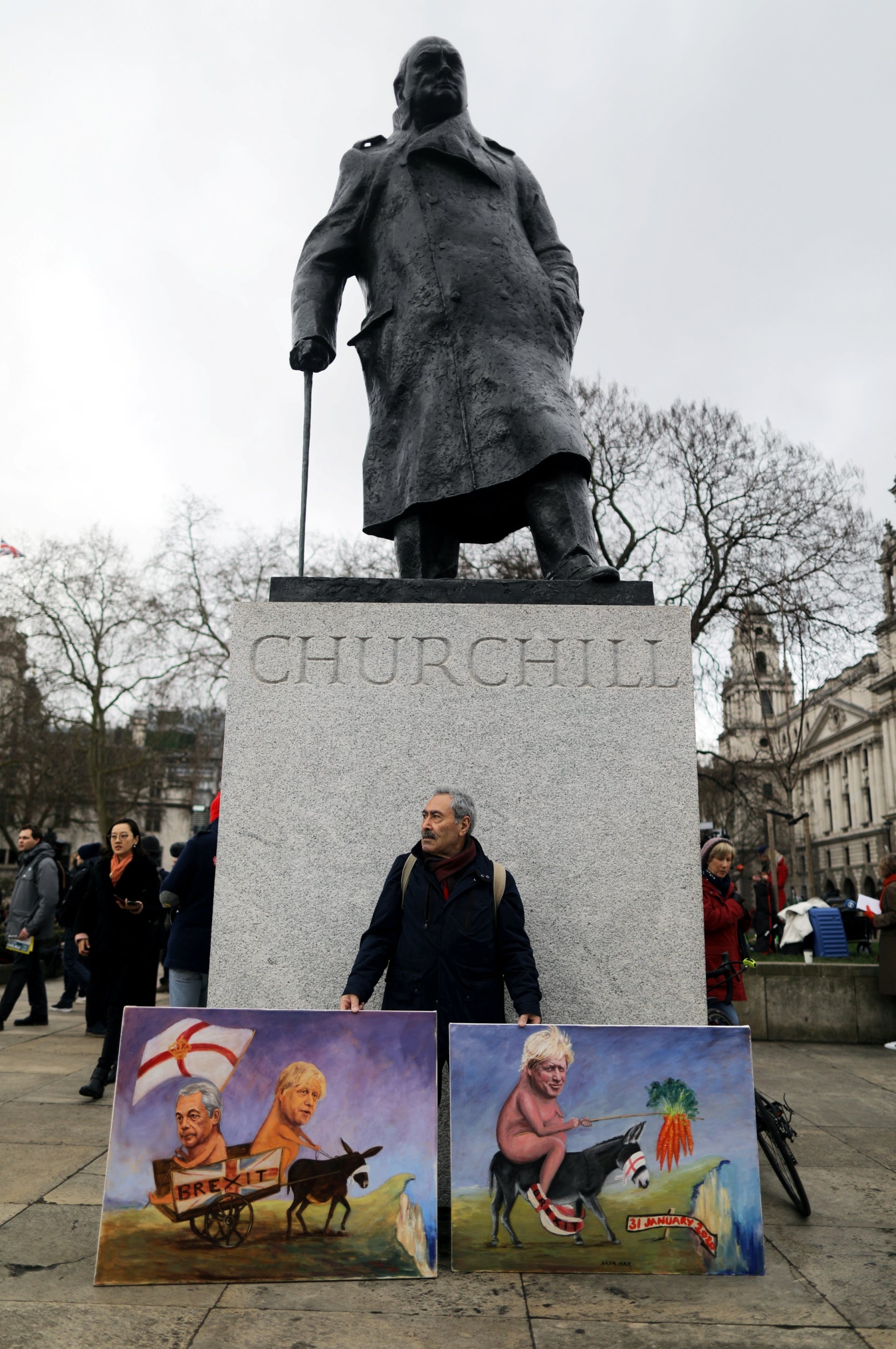
61/66
A man poses with paintings on Parliament Square
Reuters
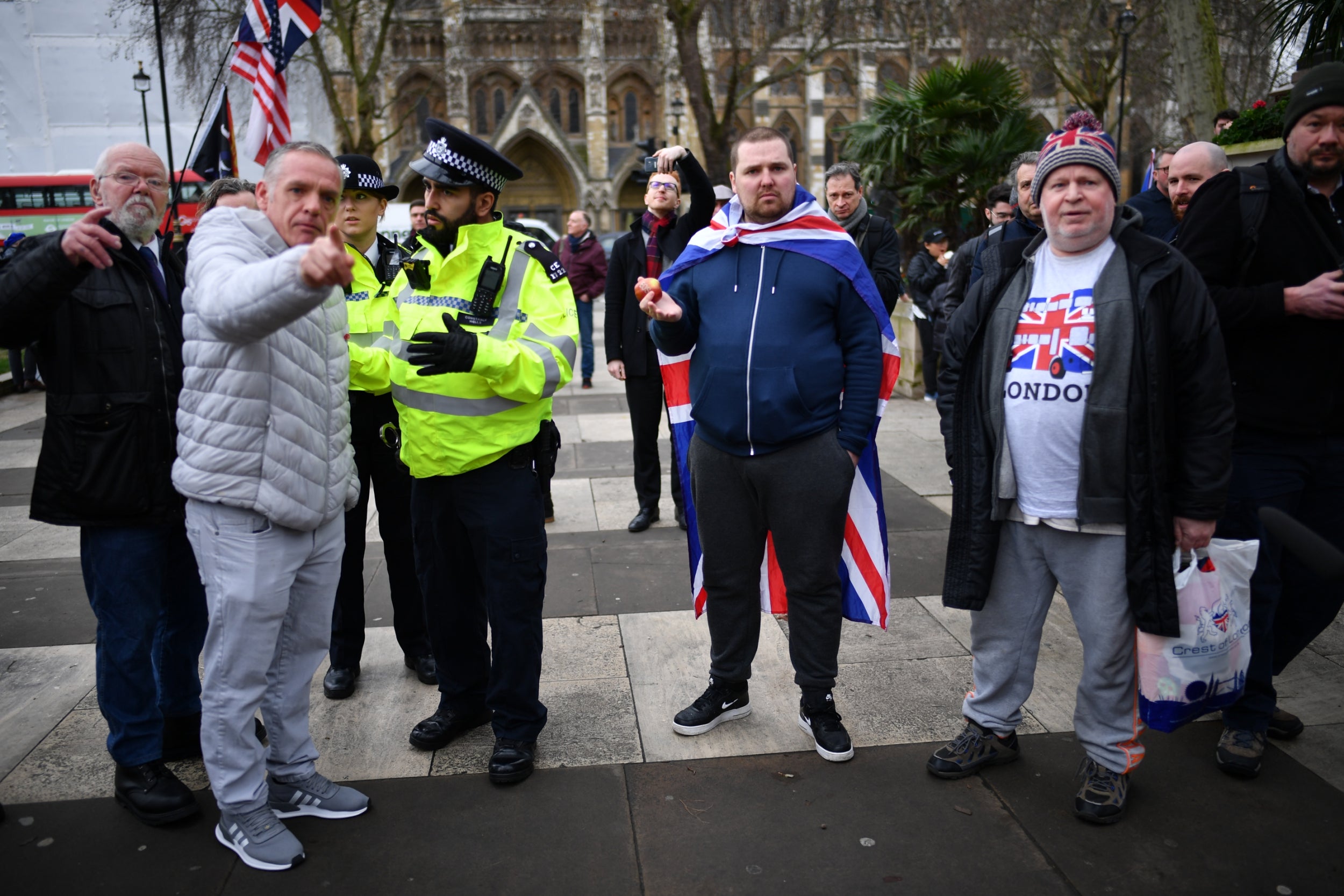
62/66
People sporting Union Flags gather in Parliament Square
Getty

63/66
A man walks with a St. George’s flag at Westminster bridge on Brexit day
Reuters

64/66
A British bulldog toy and other souvenirs at a souvenir store
Reuters
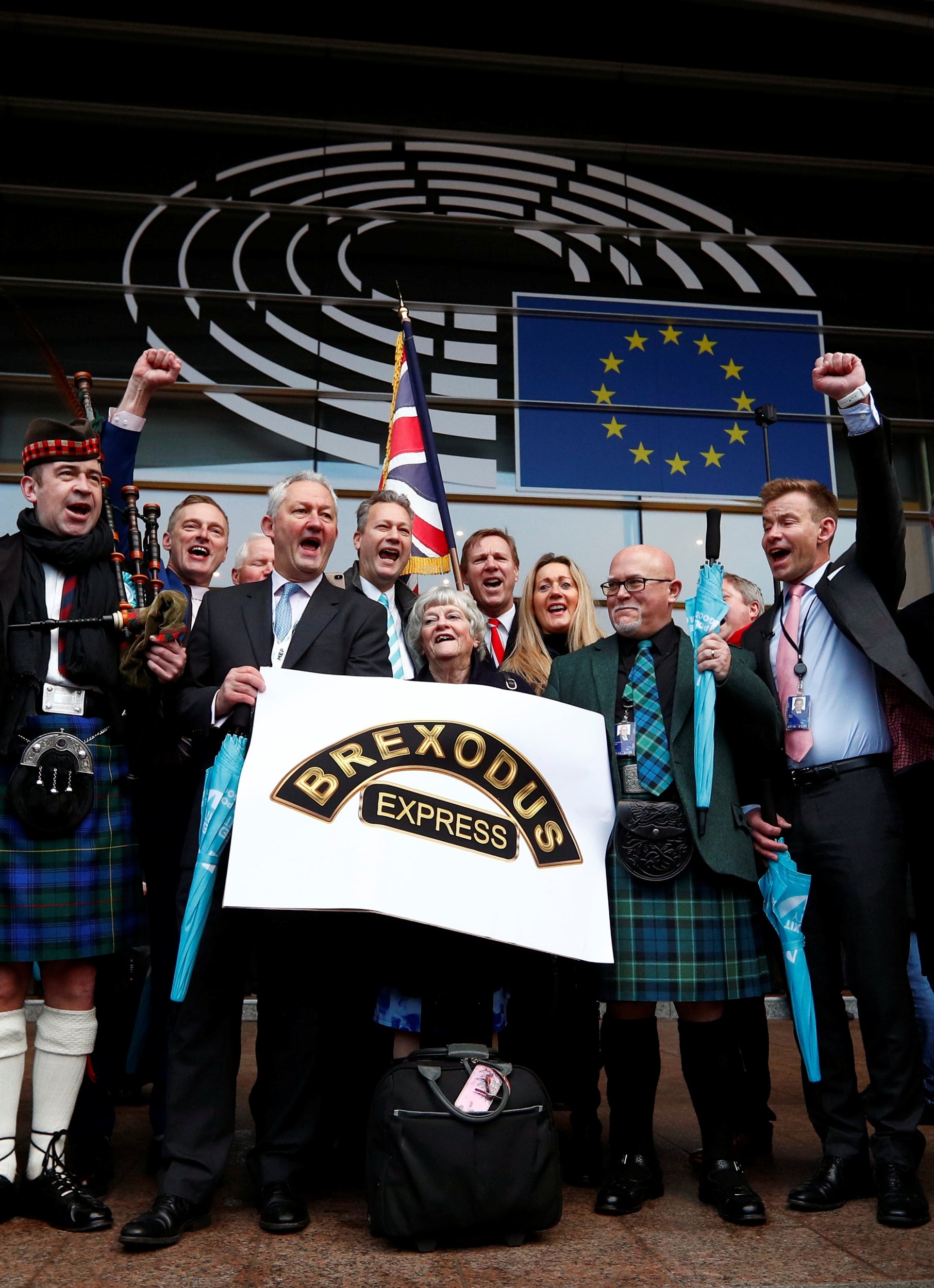
65/66
British pro-brexit Members of the European Parliament leave the EU Parliament for the last time
Reuters
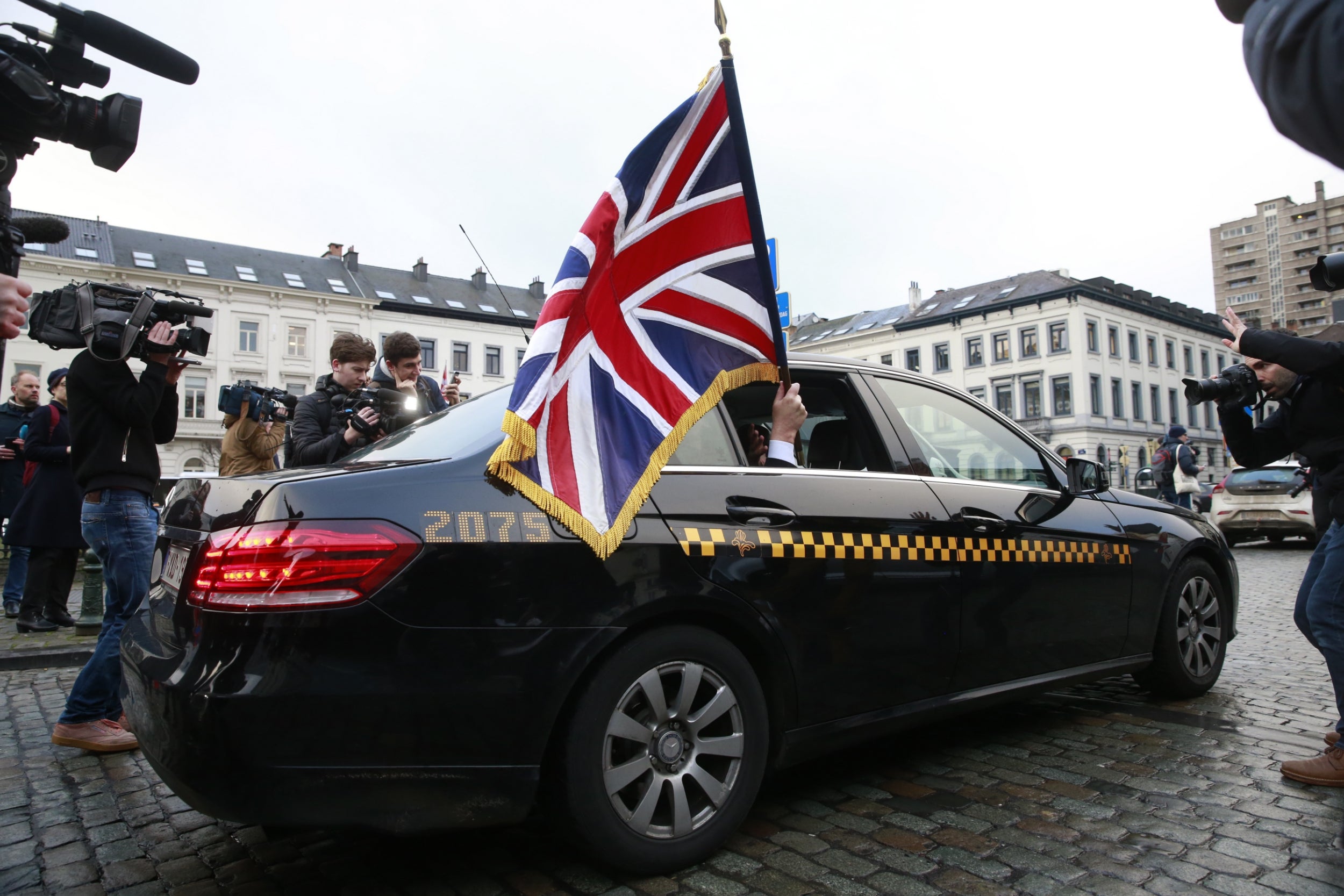
66/66
Jonathan Bullock waves the Union Jack as he leaves the European Parliament
EPA

1/66
A message projected onto the White Cliffs of Dover
Sky News/AFP via Getty

2/66
Getty

3/66
Big Ben, shows the hands at eleven o’clock at night
AFP via Getty Images

4/66
Nigel Farage speaks to pro-Brexit supporters
PA

5/66
Pro-Brexit demonstrators celebrate on Parliament Square
REUTERS

6/66
The Union flag is taken down outside the European Parliament in Brussels
PA

7/66
Pro-EU campaigners outside the Scottish Parliament, Edinburgh
PA

8/66
A pro-Brexit supporter jumps on an EU flag in Parliament Square
PA

9/66
EU Council staff removed the Union Jack-British flag from the European Council in Brussels, Belgium
EPA

10/66
A pro-Brexit supporter pours beer onto an EU flag
PA

11/66
Pedestrians pass in front of the Ministry of Defence Building on Whitehall, illuminated by red, white and blue lights in central London
AFP via Getty Images

12/66
A Brexit supporter shouts during a rally in London
AP

13/66
Pro-EU campaigners outside the Scottish Parliament, Edinburgh
PA

14/66
Pro-EU campaigners take part in a ‘Missing EU Already’ rally outside the Scottish Parliament, Edinburgh
PA

15/66
A large pro-EU banner is projected onto Ramsgate cliff in Kent
PA

16/66
Pro-EU supporters light candles in Smith Square in Westminster
PA

17/66
A man waves Union flags from a small car as he drives past Brexit supporters gathering in Parliament Square
AFP via Getty Images

18/66
The five-year old Elisa Saemann, left, and her seven-year old sister Katie hold a placard during a rally by anti-Brexit protesters outside the Scottish parliament in Edinburgh
AP

19/66
Pro Europe supporters gather on Brexit day near the British embassy in Berlin, Germany
EPA

20/66
Anti-Brexit protester hugs a man while holding a placard
REUTERS

21/66
A decorated, old fashioned fire pump in Parliament Square
PA

22/66
Pro Brexit Elvis impersonator performs at Parliament Square
Getty Images

23/66
An anti-Brexiteers stands with his dog in Parliament Square
AFP via Getty Images

24/66
Paddy from Bournemouth wears Union colours as he sits next to an EU flag decorated bag in Parliament Square
AFP via Getty Images

25/66
A pro-EU activist plays a guitar decorated with the EU flag during a protest organised by civil rights group New Europeans outside Europe House, central London
AFP via Getty Images

26/66
People celebrate Britain leaving the EU
REUTERS

27/66
A Pro Brexit supporter has a Union Jack painted onto his face at Parliament Square
Getty Images

28/66
Men hold placards celebrating Britain leaving the EU
REUTERS

29/66
Pro Brexit supporters dance in the street draped with Union Jack flags at Parliament Square
Getty Images

30/66
An anti-Brexit demonstrator spreads his wings during a gathering near Downing Street
AP

31/66
Pro EU supporters display a banner ‘ Here to Stay, Here to Fight, Migrants In, Tories Out’ from Westminster bridge
EPA

32/66
Pro-Brexit supporters burn European Union flags at Parliament Square
Getty

33/66
A man poses for a picture on Parliament Square in a ‘Brexit Day’ t-shirt
Reuters

34/66
People celebrate Britain leaving the EU
Reuters

35/66
AFP via Getty

36/66
A man wears a pro-Brexit t-shirt
Reuters

37/66
Anti-Brexit demonstrators visit Europe House to give flowers to the staff on Brexit day
Reuters

38/66
Pro Brexit supporter wears a novelty Union Jack top hat outside the Houses of Parliament
Getty Images

39/66
Customers Scott Jones and Laura Jones at the Sawmill Bar in South Elmsall, Yorkshire, where a Brexit party is being held throughout the day
PA

40/66
AP

41/66
Getty

42/66
Getty Images

43/66
Pro-EU activists protest
Getty Images

44/66
A pro-Brexit demonstrator burns a European Union flag
AP

45/66
Pro Brexit supporters
Getty Images

46/66
Pro Brexit supporters
Getty Images

47/66
A Brexit supports holds a sign in Parliament Square
AP

48/66
A man carries an EU themed wreath
Reuters

49/66
Ann Widdecombe reacts with other members of the Brexit party as they leave en masse from the European Parliament
PA

50/66
Anti-Brexit demonstrators in Parliament Square
PA

51/66
Pro EU supporters let off flares from Westminster Bridge
Getty

52/66
British MEPs Jonathan Bullock, holding the Union Jack flag and Jake Pugh leave the European Parliament, in Brussels on the Brexit day
AFP via Getty

53/66
Newspapers and other souvenirs at a store, near Parliament Square
Reuters

54/66
Brexit supporters hold signs in Parliament Square
AP

55/66
Pro-EU protesters hold placards in Parliament Square
AFP via Getty

56/66
French newspapers
PA

57/66
Sinn Fein leader Mary Lou McDonald with a Border Communities Against Brexit poster before its unveiling in Carrickcarnon on the Irish border
PA

58/66
National growers organisation British Apples & Pears has renamed a British apple to EOS, the Greek goddess of dawn, to commemorate Brexit day
AP

59/66
Pro-EU protesters hold placards in Parliament Square
AFP via Getty

60/66
Britain’s departure from the European Union was set in law on January 29, amid emotional scenes, as the bloc’s parliament voted to ratify the divorce papers. After half a century of membership and three years of tense withdrawal talks, the UK will leave the EU at midnight Brussels time (23.00 GMT) on January 31
Reuters

61/66
A man poses with paintings on Parliament Square
Reuters

62/66
People sporting Union Flags gather in Parliament Square
Getty

63/66
A man walks with a St. George’s flag at Westminster bridge on Brexit day
Reuters

64/66
A British bulldog toy and other souvenirs at a souvenir store
Reuters

65/66
British pro-brexit Members of the European Parliament leave the EU Parliament for the last time
Reuters

66/66
Jonathan Bullock waves the Union Jack as he leaves the European Parliament
EPA
Meanwhile, a separate survey by pollsters Ipsos Mori found a majority (62 per cent) think it is “likely” the UK will leave the EU on 31 December without a trade deal, compared to just 30 per cent who think Mr Johnson will get a deal by the deadline – and 25 per cent who think he can get a deal which is good for Britain.
Almost half (49 per cent) were dissatisfied with Mr Johnson’s handling of Brexit, compared to 38 per cent who were satisfied.
Ms Merkel has previously repeatedly stressed her readiness to strike a deal which would maintain the UK’s current flow of imports and exports with the continent.
But her comments today suggest she now accepts that commercial ties will be less deep unless Mr Johnson amends his plans.
Speaking to a group of European newspapers including the UK’s Guardian, she said: “We need to let go of the idea that it is for us to define what Britain should want. That is for Britain to define – and we, the EU27, will respond appropriately.
The latest news on Brexit, politics and beyond direct to your inbox
“With prime minister Boris Johnson, the British government wants to define for itself what relationship it will have with us after the country leaves.
“It will then have to live with the consequences, of course, that is to say with a less closely interconnected economy.
“If Britain does not want to have rules on the environment and the labour market or social standards that compare with those of the EU, our relations will be less close. That will mean it does not want standards to go on developing along parallel lines.”

Negotiations on a future trade and security relationship between the UK and EU are to resume on Monday after six months in which little progress has been made.
Mr Johnson has formally informed Brussels that he will not take advantage of a two-year extension of talks before Tuesday’s deadline, leaving him six months to strike a deal or see the UK crash out on World Trade Organisation (WTO) terms with the imposition of new tariffs and other barriers to trade.
The most recent Treasury estimates suggest that a no-deal Brexit on WTO terms could knock 9 per cent off the UK economy over a number of years.
Talks have stalled over EU demands for continued access to UK fishing waters and insistence on a “level playing field” on social, environmental and public health regulations.
Mr Johnson’s chief negotiator this week gave the thumbs-down to a possible compromise under which the EU would agree to give the UK the ability to break free from its rules – in return for the right to impose tariffs on its goods if it did so.
David Frost said on Thursday: “I want to be clear that the government will not agree to ideas like the one currently circulating giving the EU a new right to retaliate with tariffs if we chose to make laws suiting our interests.
“We could not leave ourselves open to such unforeseeable economic risk.”
Keiran Pedley, director of politics at Ipsos Mori, said: “The public are generally pessimistic at the prospect of a good trade deal for Britain being struck with the EU before the transition period ends and the clear expectation is that the UK will exit the transition period without a deal being struck at all.
“Any sense of a lack of urgency in public opinion on this subject may be explained by the fact many are unaware of when the deadline for a deal is, as coronavirus dominates the news agenda.
“Of course, many Brexit supporters will be unconcerned as to whether a deal is struck anyway.”
Ipsos Mori interviewed 1,127 British adults between 19 and 22 June.



